#at least that's the last time I can recall them talking about Jeanne
Text
PUPARIA
Chapter 5 - Kute
prev - chapter 1
God, what the fuck did he drink last night. Hosah's head throbbed as he strained open his eyes. Laying there for a second, hand covering his face to block the light coming in from the un-closed curtains, the still very much tiny man recalled having the ridiculous dream last night. I mean, why would he ever ask Teddy to stay the night, that was so unbelievably unlike him, he didn't think his brain could even make that sort of shit up. Turning to his side, Hosah rubbed his eyes open completely in preparation for the day.
Definitely not a dream.
The shifter had to hold down a scream when his assistant had rolled to his side, the two now facing eachother. Both of them were still fully dressed, shoes and all. Embarrassingly, the only thing on Hosah's mind was what did they do last night.
"Good morning. I was wondering when you'd wake up." Teddy sat up, leant looming over the tiny form sprawled out on the bed.
Hosah could barely gather his words; "I- We, what happened last night?" the surprise left him out of breath.
The giant looked confused for a second before turning to laughter, "Oh, god, nothing. You fell straight asleep right after asking me to stay."
Eugh. Embarrassing. So embarrassing in fact, he'd almost forgotten entirely about the previous day.
"God, we've got fifteen dead bodies to chase up. I swear these serial killers are doing it on purpose just to make my life miserable." the tiny man took a break to rub the sleep from his drowsy doe eyes, "I mean, fifteen is way too much. It's not classy, it's overkill.. Literally." Hosah wasn't so used to talking right after waking up it seemed, as his usually internal stream of thoughts came pouring out of his mouth at an uncontrollable pace.
"Mm. Are you.. Okay, by the way?" Ah, how sweet, Teddy remembered his little accidental breakdown.
"Oh, god yeah. No, I'm okay. It's just, I don't know. You wouldn't get it, but shifters, we stick together, you know? That's like seeing my brothers and sisters dead in front of me. Those are my brothers and sisters." Hosah's eyes drifted off onto his feet, which were still in his boots, "If we don't look out for each other, who will?"
His assistant layed back down beside him, face in his folded arms at eye level with the shrunken man, he had that same, stupid soft expression he always pulled whenever Hosah said anything particularly nice. "That's- Ah, that's very beautiful. I didn't realise you were so sentimental."
The detective had never really thought of himself in such a way. "Psh, tell me about it, you know what Jeanne said to me yesterday? I've got a little body and a big bleeding heart. Come on. That's cheesy. That's gross. I don't wanna think about that, I don't wanna imagine that visual." He fell back, now facing the ceiling, which was so unimaginably far away when he was like this.
"Aw, no that's cute. I hadn't seen that side of you before. Big feelings, little guy." Teddy instantly regretted his words as soon as they came out of his mouth.
"Stop. I'll throw up, seriously." neither of the two wanted to push the statement further. Besides, it was time to think about heading into the office. "What time is it?"
Hosah's room was unimaginably bare, a futon on the floor, a window with curtains, and a pair of bedside tables. This wasn't including his dresser of shrunken clothes or the clutter of painting materials that sat in the corner, but that was the gist of it. He'd been meaning to do some furniture shopping for what, five years now?
As there was no clock to turn to, Teddy leant over to check his phone.
"Seven thirty, just about." That was a relief. At least now, he'd be able to get his morning bath, he was sure he reeked of dead body after yesterday.
The tiny detective stood to his full height, barely able to keep balance on the spongy mattress, "You can use the shower if you want. I'm gonna take a bath."
The visual Teddy pictured in his head made his face subconsciously curl up into a smile. It seemed that their life really had turned into the tropes you'd find in your average, cheesy romance drama. At least with a little help, running the bath would be a much easier process.
Over the years of independence, Hosah had thought a lot about assisted living. Moving into one of those residential houses where he could be looked after, it seemed like the dream end goal for any shifter with no prospects of falling in-love. He'd decided to put the idea on the back-burner until he was in his mid thirties, he had all the time in the world to get around and find someone to love and look after him.
As he sat in the wooden bowl, half his body submerged under water, Hosah continued to ponder about his life thus far- although it was awkward to ignore the fact his assistant was sitting on the closed toilet seat to the back on him. It were times like these, when he'd seen lives be cut so short, that he thought a lot about his parents. When they were his age, Hosah was already five years old, and his brother would've been seven. He lowered himself deeper into the bath, wondering what exactly he'd achieved in the five years spent out all on his own in the big city.
Sometimes, Hosah thought it was too late for him. He'd spent so much of his twenties either hunched over a desk or barely tall enough to get around his apartment. Years of looking over missing person after missing person's cases made him wish it to have been him instead. These people had goals, prospects, promising futures, they were going to ivy league schools, they had babies on the way, they had an important job to fulfil, all things Hosah thought to be worth living for. It wasn't right to think in such a way, especially when it was down to him to bring these people justice, but it was getting increasingly hard not to with age.
Honestly, he wasn't sure if getting worked up over this- or the fact Teddy stayed the night upon his own request, was really all that worth it. There were bigger things to be worrying about, like, maybe the literal serial killer his team had stumbled upon.
"You're gonna prune up if you stay in there any longer, you know." The voice scared the shit out of him, but it was just Teddy, sitting with his feet up on the seat, patterned socks on display.
He was right, Hosah had been sitting and soaking for a while by now. Waiting until his assistant had turned to face the wall, the shifter quickly stumbled out and covered himself up. He'd embarrassed himself enough by now, flashing Teddy would be the final straw.
When the giant turned back around, the shift in his expression said all it needed to. That stupid tilt of his eyebrows, the way that everyone seemed to look at Hosah when they'd see just how terrible his condition had gotten.
"I know it's a Tuesday and all," Teddy's eyes adverted towards the ground, "But, we should hang out tonight. Get dinner or something. Do you like the movies? 'd only have to pay for one ticket."
Eh. Whatever. It wasn't like Hosah had anything productive to do once he got home. "Uh, sure, yeah sounds good. Just take whatever you need from my wallet before we leave." although it was nice to get a break from paying for his food the last week, Hosah had begun to feel increasingly bad about not paying his way. Hosah had actually been feeling bad about most things lately.
"No- no need, we share anyway, and it's not like, a fifty fifty split," Teddy's pitiful laugh as he said it was all that needed to be heard. The shifter knew he'd get nowhere by trying to argue.
Hosah was aware of how difficult it was to dance around the topic of his shifting, especially when he was, well, shifted, but it was still a bummer to hear the stark differences between him and Teddy be so loudly pointed out, even when not being addressed directly. Whenever something even slightly in reference to himself and his obvious lack of height came up, a feeling similar to that of being pelted with rocks came over him. Any sort of pleasant mood would be instantly squashed under the landslide of self awareness.
He wouldn't really peg himself as all that insecure of a person, but it were times like these when Hosah wished to have not been born this way. He wanted to argue about who payed the bill, and have it be a fair argument at that. The saying about not being able to 'have your cake and eat it too' always flew over his head when he was younger, but Hosah seemed to be applying it to his own life more than he'd like to admit.
Returning to the bedroom, draped in a towel that extended from his shoulders all the way down to his feet, the tiny detective now had the responsibility of getting ready to leave for work once more. The daily grind had gotten extremely, painfully repetitive by now, after five years of constantly being at it, rarely ever even getting weekends off, even the thought of having to wake up, get ready, take the tube, walk to the office, et cetera, had begun to wear Hosah down. He felt like a balding tire, one harsh turn away from skidding, crashing, and bursting into flames.
It barely took him half a second to decide what to wear. Despite being freshly cleaned, Hosah still looked pretty emaciated. If he could go back ten years, but remain in his current physical condition, they'd call him 'heroin chic'. The shifter laughed to himself at that thought, buttoning up the same old plain shirt he'd had for years by now. To be honest, his look would be totally in fashion if 'Victorian era chimney sweep' was a current trend. Hosah's Mom always told him that laughing at, seemingly, nothing was a sign of insanity, but he found his own thoughts too amusing to keep a straight face.
Using the little mirror in the jewellery box, the doll-sized man made an attempt to fix his hair and got a good look at his face. Seems he slept better than he thought, as his eye-bags were uncharacteristically small and light, although the prominent fat under his eye gave the illusion of having them either way. This was actually a feature Hosah had always liked about himself, mainly because he was told by the Korean side of his family about how it was a desired trait back home, if you could call a place you'd never even been home.
Looking at himself in the mirror, the shifter's thoughts lingered on Teddy once again. He thought about earlier in the morning, seeing his face so up close, the assistant's cheek pressed against the mattress, able to feel his breath brush over himself, feel his voice send vibrations to his core. Before he'd realised it, Hosah's face was flushing red again, just as it was when he first realised he wasn't alone in his room. His hand brushed over the surface of his own face, imagining what it'd be like to have Teddy's moles, or his straight nose, or his shaped jaw, or even his singular crooked fang that stuck out as he smiled.
Maybe Teddy wasn't the weird one of the two after-all, as the realisation of what exactly the shrunken blond was thinking about hit him like a ton of bricks. He needed to stop, he was being weird, what if Teddy was actually just like Edward from Twilight as he'd initially suspected and was reading his mind right now. All of these aspects forced his brain to quiet down for at least a second, giving him the time to take in his surroundings, and take them in he did.
The taller of the two could not startle Hosah this time around with his spontaneous appearance, as the shifter turned on his heels to face the approaching giant before he'd even got the chance to make himself known by his own hand.
Hosah craned his neck up, staring into the incomprehensible abyss that was six foot above him. Teddy had to be at least 6'3, probably an inch or two more if he was being honest. The shifter barely just reached ankle height, leaving way for the perfect opportunity to pull the good old 'tug on trouser leg and demand to be lifted up' trick. Just being reminded of such an action gave Hosah a blast of nostalgia, as he recalled doing the same thing to his Dad when he was a kid.
Without Teddy having realised he'd been noticed, the detective took half a dozen quick leaps forward before grabbing onto the fabric and pulling with all the upper body strength he had, "Come on, let's go,"
-~-
Having a new person around the office seemed to be doing some good for Hosah. Being assisted without feeling as though he should just find a way to do said things himself was refreshing, but old habits were hard to break, as he still found himself making attempts at tasks that, for him, would be extremely difficult to pull off, but for Teddy, would take barely the movement of his non-dominant hand. In some ways, it pissed Hosah off, making him wonder if the rookie had any cocky thoughts as he helped with ease, but it also proved to be extremely useful in speeding up just about everything he had to get done at the same time.
Maybe constantly isolating himself and refusing any aid was actually bad for his mental and physical health after all.
Ehhh, probably not.
The two actually made quite the good team, as in just two hours, they'd managed to get a missing person's family out to the office, back where all the evidence was being held. Now all that had to be done was to wait and see if they could confirm or deny the identity of body number seven.
Neither Hosah or Teddy were all that involved in these kinds of processes, honestly, their jobs were quite minor in the bulk of it all. Look for patterns in the cases, things that could link back to anything recent, or even anything that had occurred years ago, just dwindle down the possibilities of a culprit into a manageable size, that was just about it. At least, that was it on big cases such as this one. Usually, Hosah's job would be to go out to a much less severe and complex scene, usually a domestic case that had ended in a dangerous situation, and act as a mediator sort of figure, one that would provide a sense of security and trust, one that would be able to get a straight story out of someone, especially another shifter.
Being a shifter did actually have quite a few perks in those regards. A lot of people find the tiny folk to be very cute and endearing, the amount of late night talk hosts that would hang around on a random celebrity's shoulder for an interview was incomprehensible. You might think 2% of the population was an extremely small number of individuals, but it also meant there were just about 136,000,000 shifters currently living globally in the year 2009, which seemed like a lot more when put in that way.
There was just something so undeniably sweet about a person no taller than about four or five inches that the non-shifter population seemed to love, which made Hosah's job undeniably more painful that it had to be. He never minded speaking to other shifters, in fact, he'd much preferred his title of victim advocate over looking at pictures of dead bodies, it was just the giants that gave him a sickly feeling in his stomach.
More specifically, the giants on the police force. Cross communication wasn't typically the role Hosah would have to take, but on the rare occasion it was, he'd leave the station with a large chunk of his will to live having being chipped off over the course of the entire process. He felt as though he had to prove himself every time he spoke to a different officer, the shifter didn't understand what gave them the right to think so highly of themselves when they weren't even doing the hard work. Hosah felt the way they looked at him, especially in his shrunken state, like he was nothing but an object kept around to be a piece of entertainment. Psh. Whatever.
The small, disheveled man pulled at his hair to snap out of his thoughts, feeling his body get progressively more tense the more he remembered things that had pissed him off in the past.
An opening and closing of the door grabbed Hosah's attention. It was Teddy, except he had a particularly sad look on his face, one the detective had never seen before.
"Yeah, you can go ahead and put the missing persons report in number seven's file. That's him." Teddy didn't even look at the shrunken figure on his desk, he just took a seat on his chair and slumped down a little, causing it to spin to the left, facing away from the table entirely.
It took a few moments of sorrowful sighs before the assistant noticed Hosah's increasing struggles to do as he'd asked, letting out a quiet 'Right, sorry' as Teddy rushed to take over from the activity.
This field of work sucked. No matter how depressed, pessimistic or nihilistic it made him, Hosah still felt some kind of obligation to stay. Whether that be his underlying messiah complex, or the weight of his and Jules' shared history, it kept him at this desk, looking over files, and overall becoming the worst version of himself he could possibly be.
He'd never actually seen Teddy look so sad, which made sense, they'd only been working together for the past week, but it was still concerning either way. Hosah had just assumed his assistant was much better than him at the 'keep work and feelings separate' thing, but clearly they had another thing in common.
Augh. The silence was killing him. Trying not to raise any suspicions about the fact that, despite acting like he didn’t, Hosah was fond of his assistant, the tiny detective shifted his position until he sat, kneeled next to Teddy’s resting knuckles against the desk.
“So.. You okay?” Ehhh, that’ll do. Hosah had never been all that good with using words and addressing feelings.
The unsuspected close contact surprised his assistant a little as his chair wheeled back toward the table, “Me? Yeah, of course, yeah. Do I not seem okay?”
“..No, not really. You look sad.”
Teddy laughed, his eyebrows still tilted down, “Ahh, well,” he paused for a moment, taking a breath in and twirling his hands by his face, as if that meant anything, “This stuff just happens. I thought I’d be more thick skinned by now.”
Hosah knew all too well about this subject. “Ugh, tell me about it.” the tiny man shifted his position, his side leant against the giant, resting fist.
“I definitely thought, after the lesson my grandparents taught me about becoming too emotionally involved in work, I wouldn’t end up like this,” Even though he was smiling, it was obvious that Teddy wasn’t all that happy talking about it.
Hosah’s curiosity got the best of him, inquiring further with a little ‘Mm?’.
“Well, it’s a funny story actually,” From the way Teddy had mentioned it previously, the shifter could tell it was not in fact going to be a funny story. “I was like, maybe eleven, spending the summer at my grandparent’s farm, and it was really boring down there. Once I’d finished my work for the day, there was nothing to do except read or wander around, even the closest village was like, a three mile bike ride away.”
Teddy paused to run a hand through his hair, spinning on his chair so that him and the shifter weren’t face to face. “Anyway, I ended up spending a lot of time just hanging out with the animals, and this one hen was super attached to me, followed me around where she could, sat on my lap, like a real pet, you know? Well, since she was a hen and all, I didn’t think there’d be any consequence to it, I mean, we needed the eggs right? But my grandma was really annoyed, she took me out back to the shed where.. You know. I- You can probably guess what happened , after..”
“Oh, oh shit. What? That’s horrible. What the fuck.” Hosah could barely get his words out. Damn, and he thought he had some pretty brutal childhood stories.
His assistant had that same bittersweet look on his face. “After that, I thought I was hard as nails, but I guess not so much. Ah, c’est la vie, right?”
“Hmm, I guess,” what a nonchalant take. As he watched Teddy swivel back around on his seat to face him again, the shrunken detective decided not to question him further on the story. “You never told me what happened, with the family of that missing person. That’s body seven?” Hosah could infer exactly what happened, but decided to change the subject anyway.
“Right, yeah. That’s him. I don’t know. Having seen the body itself, I thought I’d take it all a lot better but.. Speaking to his parents, watching them learn their kid is really seriously dead. It just breaks my heart, you know? If I was in their position, I don’t know if I’d ever recover.”
If he could’ve, the tiny man sat beside Teddy’s hand would’ve held it in his own. “Mm. That’s how I feel towards just about every case I’ve ever worked on. Hah, we’re really not tough enough for this job, huh?”
And tough enough they weren’t. It felt as though the two detectives left on the office floor had just encountered some supernatural activity, as Hosah swore he felt the temperature drop by a few degrees in a split second. It was Jules, the head of the entire agency. The shifter didn’t know whether to give her the cold shoulder, or to thank her, regarding the situation she’d put both him and Teddy in not so long ago.
God, she may be terrifying, but she’s drop dead gorgeous. He’d always thought Jules had the looks, the height, and the body to go into runway modelling, but it seemed she preferred to surround herself with death’s imminent presence, and a few guys she can psychologically torture. It always perplexed the shifter, how someone so evil could look so angelic.
“What are you two still doing here? You could’ve gone home an hour ago, you know that right? Is he forcing you to stay back late with him, Edward?” Jules took a seat on the desk at which the two detectives sat both at and on.
No matter how much she pissed him off, Hosah always fell back on the ‘but she’s so beautiful though’ excuse. Despite the fact her jaw and cheekbones were as sharp as ever, her features were all still so soft, as her eyelashes and eyebrows were the same almost white blonde colour as her long, slicked back hair. He had no idea how anyone could make a pencil skirt and ill-fitting blouse look so high fashion, but Jules just had that kind of look to her.
“No, no, just got busy with chasing up missing persons reports. We got one, number seven isss..” Teddy’s hands were shaking a little as he grabbed the file from Hosah’s side, where the giant’s hand once rested. “Here, Charlie Laurent. Reported three months ago today.”
Her hand wrapped around the rookie’s wrist as she tilted the file toward herself, “Hmm, oh, right. Alice told me he’s guessing the bodies were ordered in a particular way, by when they’d been killed, based on decomposition stages. Still waiting on all the autopsies to get back to us to confirm that theory though.”
Alice was Jeanne’s last name, honestly, most people around the agency referred to him as such, sometimes Hosah felt like the only person who actually knew his first name.
Just as quickly as she came, the slender woman hopped up off the desk, giving Teddy a ruffle of the hair on her way out. How she could do that in heels, no one knew.
Once the coast was clear, the assistant leant in, “God, I’m shaking.” Teddy whispered as if he didn’t want her to hear him, despite the fact she had long left the room. She always did this kind of thing, start a conversation, then leave whenever she got sick of talking. There was really no rhyme or reason to her behaviour, that’s just the type of person she was. The type of person that made no sense at all, which is what made her so enticing and so scary at the same time. Unpredictable, that’s what she was.
“She’s not really all that scary. Then again, I’ve known her for like, ten years by now.” The tiny man shrugged, standing up preparing to leave himself. “Anyway. That doesn’t matter. What’s on at the theatres tonight?”
#Another Meh#But next chapter is date night so hopefully less Misery and more Will they.. Won’t they……#g/t#giant tiny#g/t ocs#sfw g/t#gianttiny#g/t writing#Puparia_tag#oc hosah#oc teddy
2 notes
·
View notes
Text
Ishida Sui’s Review of 2019
I didn’t think I’d ever finish this with my onslaught of classes including pharmacology, but I somehow managed! 6k word count, the longest TL I’ve done to date besides Parvati’s interlude for FGO. Lots of insight into Jack Jeanne’s production and what Ishida’s been up to for the past year. It was tough to translate because it was so long, but I had a lot of fun.
Let me know if there are any mistakes, I’m sure there’s a whole bunch. Have fun reading!
Original can be found here.
***
2019.
I’m reflecting on this past year while flipping through my agenda.
Since I’m writing this for my sake, there’s going to be a lot of sections without much explanation.
January

○ This was when Jack Jeanne had yet to be announced, so I was mostly doing preliminary work at the time.
Stuff like “BU” and “character facial expressions” will be finished some time this month, is written in my schedule book.
○ New Year’s party in Tokyo from the 16th - 19th.
The New Year’s party is a joint party that’s comprised of the 4th editorial department (Shueisha’s seinen magazine branch) that’s held every year in January.
I attended the party with the staff every year during serialization, minus my first year.
2019 will be the first New Year’s party since the series ended, but I thought I should stop inviting the staff to attend since we’re not working together anymore (plus it’d be a hassle), so I didn’t really invite anyone.
But the day before the event, Editor M brought up the topic inside the taxi and asked, “Are none of the staff coming this year?”
(Even if they’re invited now, it’s going to be impossible, asking them to fly the next day and causing a ruckus…)
When I replied, “Hey, I’m sure it’d be fun if you invited them and they all came~”, the editor contacted Goubaru-kun, and after said, “He said he’s going.” Guess he wasn’t busy.
In the end, the staff during serialization and several people from OB and OG came, almost identical to the lineup from previous years, and it occurred to me that maybe I should have just invited them from the start.
Anyway, at this year’s New Year’s party, I don’t really remember much of what happened.
I talked with my senpais from back when I was an assistant for Kingdom, and outside the venue I sobered up from the agoraphobic dizziness I was feeling inside.
At the second party I remember people talking to me haphazardly and being photographed.
I wish I’d refused.
Also, I was sexually harassed by Rikudou Matsubara, my senpai from the same region as me.
This New Year’s party will be my last.
February

Briefing session for the game held in Tokyo. Key visual created.
It says here [on the agenda] that I want to go to Kagoshima.
Every week there’s a checklist for 10 km of jogging and weight training 2-3 times a week.
I spent about a week doing some composition work.
It ended up being helpful for me, but it made me decide not to work anymore with people with different levels of interest from me.
○ TRPG is written for the 28th. Usually we use the DX (Double Cross) system, but this time one of our participating players, M’s schedule was under mysterious attack.
As game master, taking consideration of everyone who’d made time in their schedules for tonight, I thought we could switch to Cthulhu and asked them to wait an hour. 2 hours later I finished coming up with a scenario and began the session. It was fairly fun.
March
Finish BU this month, is clearly noted down.
BU stands for bust-up, which are drawings of characters in standing poses [sprites] that are common in ADV games.
Normally, since it takes a huge amount of work, the BU work is always divided up.
The original drawings are done by the illustrator, in this case I do the base illustrations (line drawing & colouring), and using them as the base, the department sharing the work cleans up the line drawings and recolours it...that’s how the process goes.
But since I’m a mangaka and don’t have the technology needed to make gaming assets, I thought it’d be best to leave it to the pros in that field, so that was how that stage proceeded.
At that point in time at least.
I also had plans written down to go to Kagoshima. Looks like I didn’t go.
○ TRPG on the 25th. Player M’s schedule lined up with ours, so we played DX with 6 PL plus me as GM. We went to the aquarium, were attacked by witches, and so on.

April

Finish BU, is faintly written down.
It seems like the work was more or less completed earlier this month.
○ High school friend K’s wedding on the 6th.
Up until then I’d only been to two other wedding receptions.
The weddings were for a different friend from high school, and Tajika-san, one of my senpais from Kingdom.
This suddenly reminds me of that time at Tajika-san’s reception, when I took a super early flight because I absolutely didn’t want to be late whatsoever, but I ended up not being able to fly for about an hour and a half because of engine trouble or whatever, so I entered at almost the same time as the bride and groom during the reception…
K’s wedding was the first time in my life where I was present all the way from the wedding to the reception, but how should I put it, I was struck by a beam of light.
I don’t know who he’s getting married to, I have no clue what their relationship is like. But I was somehow bombarded...by all these thoughts that became jumbled in my head, like the energy in this place, the power of their oaths, questioning what it was, how light isn’t always justice.
I got the feeling that this was what proper, respectable humans take part in, but since I'm fine with not being a proper, respectable human, I decided to not do anything other than what my heart desires.
I'm definitely not good with places where I’m in the spotlight. But congratulations.
○ “Play Sekiro” is strongly noted down.
Thank you for supporting me in the first half of 2019.
○ TRPG for the 29th - 30th. DX.
Player M’s character dies.
May - June
My schedule book is starting to look more scattered now.
On the other hand, since I’ve got a good memory of this time, I can write while recalling the events.
○ I did the covers for the Touken stage play book.



I drew the cover illustrations for the Touken [Ranbu] stage play that Mikasano-san, who I’m grateful to for his work on the anime and movie scripts for TG, worked on.
In my mind, it feels like I'm watching the back of who I'd consider my older brother in the creative world, or a fellow comrade on another battlefield fighting to the death.
I think it came out quite charmingly, so I’ll include the links for now.
Link 1 | Link 2 | Link 3
During this time of work for Jack Jeanne, I was working on “model sheets”.
Blueprints for the characters’ attire, not just from the front but also the internal structure.



Unlike most other games, Jack Jeanne has “performance costumes” in addition to normal attire.
Because of its “revue” theme, costumes that will be worn onstage needed to be prepared.
I was shocked when I suddenly admitted that I needed model sheets for 5 different performances (spring, summer, fall, winter, final) for the 6 main characters, making 30 designs in total.
Back in the TG era, these kind of drawings that I just explained, or drawings that needed a lot of layers, were a pain in the ass. Plus I wasn’t good at them, so I thought that I didn’t want to do it for the rest of my life if possible.
But it seems like I have to do this myself.
With a sense of determination, I decided to work solely on this for all of May.
At the same time, I made nothing but curry for all my meals.
There’s no deep reason behind it, but my aim was to kinda boost my ability to concentrate daily by choosing to be decisive in that action.
○ Working on model sheets
It came with an unintended effect. Because I spent a month on work that required balance and consistency, my right-left checking skills got better, and completely unrelated, I improved in drawing perfect copies.
The design work for the model sheets itself became really fun to do, starting around when I became obsessed with the scarf design (sumo wrestler drawing) I definitely couldn’t use for Neji’s summer costume.
I discovered that it’s precisely because I’m not good at this that my labour bore fruit. I feel like this was my experience for the latter half of the year.
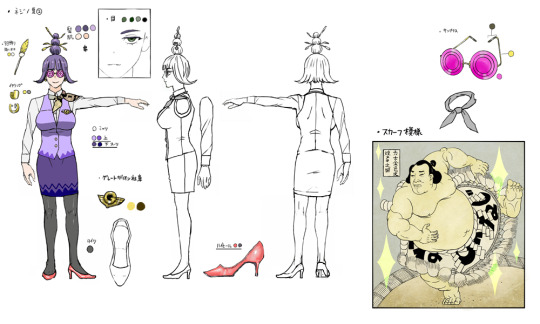

July
The cast members were chosen.
Unlike TG, there are 6 people + 1 person who can be referred to as the main character, so it was interesting to have a cast with some breadth.
Seems like lyrical work was the main thing I worked on.
Lyrical work.
In Jack Jeanne, each performance contains several songs to sing and dance to, so each one is supposed to be sung.
...hence the lyrics.
The topic of what to do with the lyrics was brought up in November 2018.
What happens typically is that, let’s say there’s singing in an idol game, then a company that specializes in it is asked to produce the songs.
Even for Jack Jeanne, there were several candidates I could pick and choose from.
But after a quick look-through, frankly speaking, they all looked the same to me.
There’s one person that’s good, it’d be great if we could get them...is what I thought, but, “Even though I don’t have the skills, I’m the one who understands this world the best,” crossed my mind.
...should I try?
I tried it.
To be honest, I was super embarrassed since it’d be seen by a lot of people, but it evolved into, “Who cares if you’re doing it?”
And so Jack Jeanne’s lyrics were tasked to me.
I mentioned this earlier, but there are multiple songs for each performance.
So if you combine those plus the opening and ending songs, that makes 17 songs in total. Lyrics for 17 songs that I’m fully responsible for.
What the hell...am I doing?
Maybe it was from that moment that I started losing it.
Including the lyrics that I’d been working on bit by bit every month, the remaining ones were finished in one go this July.
By the time I finished everything, my current state was, “Give me more songs...let me write more lyrics!”
But it wasn’t over just yet.
August
Every time I meet someone I tell this story. I’m thinking of keeping it up.
Here I am, relieved to have finished the lyrics, when a message pops up on the Skype group chat.
It’s from Yamashita Daisuke of Broccoli.
To briefly touch upon Yamashita Daisuke, he is a young man who’s been involved with this project since October of 2018, and a poor soul who was tasked with conducting very important meetings on his third day of working at the company.
The producer from Broccoli was going on maternity leave, so he was scouted as her replacement.
As an aside, if I have to be honest, the exchanges between me and Towada-san, and Broccoli’s Jack Jeanne team up until then were quite frustrating.
“How about doing it like this?” they would counter.
And we’d respond with something like, “This part is going to be developed later on, and since this will become foreshadowing for the entirety of the story, it can’t be modified that easily.”
This kind of situation, having to explain everything in detail one by one, going 3 steps forward and being held 2 steps back, had been going on for about 3 years, so the two of us would often whine about it over drinks, going, “When should we quit, this is ridiculous,” etc.
Finally when things began going more smoothly, the producer who was leading the project took her leave, so I wondered if we’d be able to get along with Yamashita Daisuke, but he was, how should I put it, very diligent.
For the last year I've been working with people who don’t put in their best effort, so I was very hopeful and thankful to him.
But I digress.
This was the gist of the message that Daisuke sent.
“Kosemura-san’s who’s in charge of musical composition wants ‘scratch vocal tracks’ for when the singers are recording.”
“Does Ishida-sensei happen to know anyone he could ask for this favour?”
“I’m sure it won’t be a problem for you!”
“Frankly speaking, it’s okay even if they’re bad.”
Huh.
Well, as you might have already guessed, even with the lyrics, it’s impossible to really understand the song at first sight without knowing what kind of rhythm, what kind of emotions are being expressed in the bar measure.
Of course we’d need ‘scratch vocal tracks’ to explain the general feeling of the song.
Now, what Daisuke said was, “Do you have anyone you can ask? It’s okay even if they’re bad. Or even you can do it.”
But if I found a “it’s okay even if they’re bad” kind of person, we’d still have to show them how to sing it and explain how the rhythm goes.
Daisuke already knew which was probably why he asked for the favour.
“The person writing the lyrics would be able to make the scratch vocal tracks the fastest.”
...come to think of it, the demo songs that Kunimitsu sent me every time that were sung using Vocaloid, weren’t they also scratch vocal tracks?
Daisuke must have been in a pinch trying to figure out how he should ask me candidly.
Ishida-sensei, I couldn’t just ask you to sing it, so I had to ask in a roundabout manner.
I’d already given my answer, but I was still hesitant.
It’s true that after I finished writing the lyrics for the 17 songs I’d already lost sight of myself, but if I sang, my singing would reach Broccoli and Kosemura-san’s team’s ears.
But I couldn’t just leave poor Daisuke hanging.
So I consult Towada-shi, whom I’d been collaborating with in creating the scripts for Jack Jeanne, for advice.
(He had been in charge of TG’s novels, and I’ve known him for a long time.)
“Did you check Skype?”
“I did.”
“What do you think?”
“Start by looking up scratch vocal tracks,” so we paid a visit to YouTube. The first search result that came up for ‘scratch vocal track’ was a video of a vocalist who was used to sing a scratch track for AKB or something.
I see, so that’s what it looks like. Innocuous, but I could see it was very professionally done.
And the second result that came up was Tsunku♂-shi.
The figure of Tsunku♂-shi himself recording a scratch track for his idols.
The producer himself became an idol, and was singing really cutely, in his emotions and how he sang it.
“This is it?” I said.
“Yeah, it is,” Towada-shi agreed.
If Kosemura-san and his team, and the people who will be performing the songs have to listen to it, it’d be a disservice to them to half-ass it.
I don’t like people who don’t try their best. That means I have to show that attitude myself.
Let’s come out of my shell for poor Daisuke as well.
“You’re gonna become Tsunku♂.”
“Yeah...I’m gonna be Tsunku♂!”
And that was how I became Tsunku♂.
I replied to Daisuke on the Skype group chat.
“Understood, I’ll do what I can.”
So this guy, who doesn’t even know what the ‘D’ in DTM stands for, first downloads the software, and begins setting up a recording environment. Other work is pushed aside. I set 3 days to work on this.
I timidly begin working on the scratch tracks.
From the perspective of someone who doesn’t have to listen to their singing for a living, it starts out as a living hell, but you get used to it as you listen to it over and over.
And so I kept learning new things.
I noticed I was harmonizing with myself.
Just like Tsunku♂-shi, I’d change the voice for each character.
If it was Jack (male in a male role) I’d sing like a man, and if it was Jeanne (male in a female role), then like a woman, while the main character Kisa (female) should sound cute...
No, Kisa needs to be cuter! I re-recorded her part many times.
Depending on the song, I’d sing for 7 people.
I was Jack Jeanne now.

Tsunku♂ (I) recorded 17 songs in 3 days, and sent the data first to Towada-shi.
Since I was now Tsunku♂, I no longer felt any sense of embarrassment.
“I listened to it,” the reply came, and I called him.
Towada-shi was roaring with laughter.
I regained the embarrassment I’d forgotten.
“Oh no, I was laughing ‘cause I was impressed,” he said, but my heart was already as fragile as that of an abandoned dog.
“Even this is a big help to Kosemura-san, and Daisuke should be grateful, right?”
Yeah. Although Towada-shi guffawed at me, Daisuke will surely thank me.
And then he’ll definitely tell me what a good job I did!
I dumped the music into the Skype group chat.
“I did what I could,” I added.
How will Daisuke react to my Tsunku♂?
I waited restlessly.
Three days later on August 5th, a formal message arrived after it was received.
“Thank you very much. We will schedule a meeting with Kosemura-san…”
I couldn’t believe my eyes.
My hard work got dismissed with, “Thank you very much.”
Daisuke, why?
I thought you were in a pinch, so I...were...were you fooling with me from the start? Answer me! Daisuke!
Just tell me I did a good job, or follow up with something, I’m fine with anything!
So much for my heart being like an abandoned dog, it’s more like a grown-ass man left naked on a snowy mountain.
I did what I could! This feeling was welling up inside me, but was it myself that managed to do it?
○ Later, at a meeting with Kosemura-san
“It’s great that you could do this much for us. You didn’t have to do all that.”
With the gist of those words, a warm blanket was finally placed over my heart, which had almost frozen to death.
“I didn’t know how to respond. I wasn’t sure if Sensei was the most who did it in the first place,” Daisuke said, so I decided to satisfy myself by threatening, “I’m gonna tell this story until the day I die.”

September
○ Responses to the Questions to Ishida Sui contest
We did a “Ask anything to Ishida Sui” contest as a project for the art book “zakki:re”, where purchasers could apply with a postcard.
I was writing the replies for them.
I thought there’d be a lot more questions about TG or its contents, but surprisingly there were a lot of questions asking for life advice.
There were quite a few questions that I had to seriously think about to answer.
It was kinda tough since there were over a hundred of them, but I thought it’d be nice to get in touch like this every once in a while.
○ BU work for Jack Jeanne
Once the music-related tasks like lyrical composition and scratch vocal tracks were completed, I worked on BU.
...BU work? Wasn’t it finished back in April?
Well, a similar situation arose just like what happened with the lyrics.
Regarding sprite quality I might not be able to beat the pros, but since I’m the one who best understands how the characters look best and their body balance, I had decided to do all the line drawing colouring myself in June.
I had no clue whether I’d make the deadline or maintain the quality, but thanks to Broccoli’s understanding, I was allowed to make it myself.
I realized once again that I’m terrible at splitting up work.
If I can do it by myself, I will.
Plus, it’s, how should I put it, starting from my TG days, even though it wasn’t a lot I got to see various types of workplaces.
I’d see places where there was no sense of responsibility whatsoever, or the work may have been divvied up appropriately, but it felt like they were making something without a sense of purpose, like a main plot line that isn’t going anywhere.
It’s impossible to accomplish big things with that kind of stance, and I understand that the more people that intervene, the more uncertain the core becomes, so I didn’t like that kind of approach.
It makes me wonder whether there’s any meaning in creating a work that’s conservative and unchallenged, and if it’s nothing more than a money grab.
Since I don’t have any desire for material things, getting fed up about it is useless, but I just can’t help thinking about it.
Of course, it may be difficult to get what I want 100% of the time, but I want to create things in an environment that I think is beautiful, even in places that I’m slightly involved in.
...in other words, BU work is tough, but I began remaking the sprites once again by myself.
This was the toughest work I’ve ever done out of everything, including the serialization...
○ Scratch vocals training camp at the end of September
I went to the recording for the scratch vocal tracks.
Based on the scratch tracks that I made, we got professional vocalists to sing it again properly.
This is what the actual cast would use as a reference to sing.
(So my version was like the pre-scratch vocal track.)
I was stuck in Tokyo for almost a week.
Wake up, get ready, go to the recording studio.
Come back at 8 or 9 pm, rest and sleep, repeat.
It was like I was back in school, and since I don’t have a steady lifestyle, I enjoyed it.
Kosemura-san’s team is really great, and I know I mentioned this before, but I felt like their workplace was a very healthy production site.
When I was drawing manga, I never had much time to talk with fellow manga artists, and I’ve never had the chance to experience what other professionals’ workplaces were like, so it was very exciting for me to see people as professionals tackle one thing seriously.
The vocalists were as amazing as I expected, and although my scratch tracks were played at a loud volume to annoy me, I had a great time.
The game might have a high level of entry, but it’s worth listening to just for the songs, is what I truly thought.
○ Parting words to Editor M-shi
This might have been back in August, but from 2018 to 2019 I had a lot of things on my mind, so I began talking to the editor.
In between the 11 years of serialization starting from my rookie days, I’d received guidance from him so it wasn’t easy, but I expressed to him that we should keep our distance for any future works.
“I want to become absorbed in myself, not to Ishida Sui or Tokyo Ghoul,” I told him.
The other part said he also felt the same way, and accepted it.
The next time we meet, I hope we can talk about what we’re into, what we’re going crazy over, he said.
And so, 2 months after that conversation was the scratch vocals training camp in Tokyo, and I had the chance for the two of us to talk again.
That day I was completely tuckered out from recording the scratch track, but it was a day filled with accomplishments.
He took me to a restaurant with delicious food in Ebisu or somewhere, and after concluding our brief business meeting, I tried throwing out the cliched, “So, what are you up to lately?”
As the lead writer, there was a part of me that was curious about how he was doing after that talk we had.
The editor began talking about homemade curry.
...that’s what he’s into?
I decide everything from selecting and picking the ingredients myself, and next time I want Ishida-kun to also see how delicious the curry is...he told me passionately, but how should I put it, the conversation wasn’t very spicy.
The food was delicious.



October
○ BU work

What’s hard about BU work is that it’s difficult to separate the layers according to the face, hair and clothes, and they all have to have the same style and touch to it.
If it was manga, then maybe...no, even in manga, there’s still some need to match the outfits, but it doesn’t really matter to that extent.
It’s because I don’t like game sprites.
“This character has so much energy from their sideways pose! Amazing!” This never happens…
Around this time of the year, my older sister called this elaborate task, “the task you’re probably the worst at.”
○ The bean life
I’m not really fat in particular, but I made up my mind to try dieting.
At the time, my body fat percentage was at 18%, and I’ve never been below 10% ever in my entire life, so I’m thinking of aiming for that.
Instead of eating rice with unseasoned chickpeas and black soybeans, I began my lifestyle of consuming vegetables and cuts of meat with less fat.
Hopefully I can achieve my goal in about six months’ time.
○ Ano-chan, Honda Keisuke, and I
After Ano-chan left “You’ll Melt More!”, her official Twitter account removed every single account she was following, but for some reason only two people remained.
Those two people were Honda Keisuke and Ishida Sui.
To Ano-chan, Honda Keisuke and Ishida Sui belonged in the same category.
After some time passed, even we were removed, but I consider this one of my hottest mysteries of 2019.
Ano-chan!
I’ll always be waiting, so let’s have tea some time with Honda Keisuke!

November
○ BU
Need I say more.
○ Main cast’s first recording session from the 26th - 27th.
I visited Tokyo with Towada-shi to supervise the main cast members’ recording session.
Wow, everyone was so amazing~
Of course, not just the main characters. Terasaki Yuka-san who plays the main character, Tachibana Kisa, was wonderful as well.
In this kind of game genre, the position as the main character feels less important than the male characters, but I want her to stand firmly in this story’s script.
I thought it’d be nice to have the main character not stand out too much and have her watch over the male characters, and I felt that Terasaki-san’s voice and acting fit that image perfectly.
About the cast members, it seems like there’ll be a chance to speak to them eventually, so I’ll come back again.
○ 1 month into the bean life
I’m steadily losing weight.
Basically I always work from home.
I go to the gym and supermarket 2-3 times a week. I started cooking for myself.
I got a brand new refrigerator to replace the one that suddenly broke. It actually cools things down now.
Living standards have risen.
December
○ I break off ties with M who I played TRPG together with.
He was a former classmate who was even chief assistant at some point during the series’ run, but eventually he ended up getting fired due to falling asleep at work.
He said he’d attend the last session for the story that day (although his own character had already died), and I was working on a schedule to accommodate him, but once again he cancelled at the last minute.
It’s fine to cause trouble for me (although I’ll probably get pissed), but I can’t overlook treating others the same way.
And it’s not the fact that his schedule didn’t match up, it’s because he was complete trash who didn’t know how to behave like an adult once he made plans with others, that I felt sorry for the other TRPG people who took time out of their schedules.
Since I felt ashamed when I was together with him, I decided I’d had enough.
This was a year where I cut ties with a lot of people, but I think what they had in common was that I was ashamed to be with them.
From now on, I don’t want to associate with such people.
What’s more, when I finally told him, he didn’t even try to deal with it and just gave up, responding, “So that’s how you felt about me. Okay. My bad.”
I won’t go anywhere with those kind of people again.
○ The bean life ⇒ the potato life.
I changed it to potatoes.
○ BU is over...
On December 17th, I finally finished the BU work that I spent ageeeeeeeees on.
Although I said that serialization is tough, as long as I finished 18 pages a week that was it (although there were times where I was chasing myself with other work), so I could finish it as long as I didn’t sleep.
I somehow managed to finish both the manuscripts and the colour illustrations this way, so expecting BU to be similar, I wasn’t really scared about it never ending, but BU truly was despair.
When is this gonna end? I’m even working super hard…
This is how it went on the entire time for over a month.
There were about 200 different sprites I had to make myself, including the different costumes and poses, and I had to do all of them.
For one thing, when, “This process is necessary,” came out, I had to go through the same process roughly 200 times, that it felt like I was facing the final boss who already transformed many times.
Also, it’s like not equipping myself with a lot of equipment and recovery items in the previous town, but the dungeon I somehow managed to enter is extremely dangerous and even though there’s no safe points anywhere in sight, the boss suddenly comes up behind you, and you go I’m gonna die I’m gonna die
○ If you eat a lot while you’re losing weight, you’re going to have a bad time.
On December 15th I had trouble concentrating, so I tidied up the living room, created a space in the middle of the room, and darkened the lights.
After an hour of meditating, only the sound of my breathing could be heard in the room, and so I went back to work with renewed concentration after confronting the issue (like a monk?).
On December 16th, I’ve been working the entire time since morning. I thought today was going to be the last day, but an entire day has passed and I don’t have any energy...
I’ll buy a midnight snack, replenish my energy, and end it once and for all. I’m trying to lose weight, but I went to the convenience store while thinking about how I’m gonna eat a katsu sandwich (I didn’t have the energy to cook).
While looking for something at a convenience store I can eat during weight loss, I think back over the last few months.
Like how it seems like BU is finally over, how a lot of things have happened, how I’m working hard, how lately I’ve been eating only potatoes, vegetables and meat.
And then I suddenly thought, “I wonder if the reason I don’t have any energy is because I haven’t had any rice lately.”
...I thought I should go on a diet in October, so I’ve been living a very modest life since then.
Thanks to that, my weight has steadily decreased, and my body fat percentage has gone down 3% to 15%.
What will happen if I continue with my relatively strict dietary restrictions during this difficult time?
...even if you’re losing weight, there’s a technique you can set up to binge eat during periods where weight loss stagnates, called cheat day (though results may vary), but what is it that makes no-cheating so inefficient even for weight loss?
...should I have a cheat day today?
“Huh, is it really okay?” I asked my mind. “Do it!” was the answer I got.
From that moment, everything around me morphed into things I could eat.
No exaggeration, my knees trembled.
I crammed into my shopping basket carbohydrates, carbs, more carbs…
It’s okay just for today, I say as I shove cream puffs, dorayaki, pudding, Family Mart chicken and ice cream.
(Even if it's a cheat day, it’s probably not a good idea to take non-nutritional foods, but shh.)
With food in both hands and in high spirits, the first thing I ate was the delicious part of the Family Mart chicken.
I groaned loudly, all alone in the room.
Alright, let’s finish this work! I was energized, but my blood sugar levels spiked so much that I felt extremely sleepy and went to bed instead.
The next day on the 17th, I wake up at 4 am and immediately notice something unusual.
My body is burning. I’m sweating.
I immediately wake up, and overflowing with energy, I head for my desk.
I’m working actively, and I finish the BU work.
It felt like I was pushing forward with only positive energy, feeling uplifted.
I break out a laugh at a slight joke I found funny from a foreign drama (The Mentalist) I’m playing while working.
The greenery of the plants and the lighted sink glisten, and the scenery is vivid.
What is this?
I suddenly recall the story of a YouTuber I saw recently.
He lives in a region where medical marijuana is legalized, and he explained in detail what changes would occur if you smoked cannabis.
To put it roughly, you feel calm and your senses sharpen. Trivial things can become funny, and funny videos can make you roar with laughter.
Then maybe...I thought, I'll watch Nagareboshi (a comedy duo) on YouTube.
Usually I go, haha, that's funny! But that day I exploded with laughter...all of their videos were just too funny.
I learned that when you’re losing weight and suddenly eat a lot, it alters your mind and body as if you smoked cannabis.
(※ Just to be clear, I don’t know what cannabis is like.)
Thus the BU work ended with me being high as a kite.
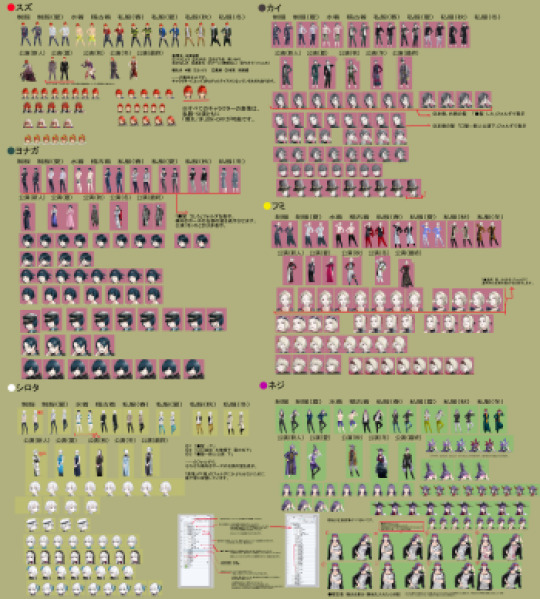

(※ I’m covering it with mosaics for now. I’ll remove it once I can announce it.)
○ I stopped playing TRPGs.
I’ve been doing it for about two and a half years, but it also helped me in honing my creative skills.
I’d sometimes perform, so it was useful when I was recording the scratch vocals…
It was a good experience, managing to vicariously live the energy of ending a story.
It was a story about a group of friends, so it was easy to appreciate.
Summing up 2019

After the weekly series finished in 2018, I was in a daze for a few months, but in 2019 I worked only on Jack Jeanne for the year.
This year I tried various things, and trite as it may seem, felt the possibilities within myself expanding.
I had many opportunities to realize how important it is to keep a distance from bad things that don’t do anything for me.
During my work on Jack Jeanne, I vaguely thought about my future creations.
The work I’m doing now in game production is fun so I wonder if I can keep working in this field, but I’d also like an environment where I can release things more constantly.
I can’t promise anything specific, but I’m going to work on things that I want to do.
I look forward to what 2020 has to offer. Have a happy New Year.
2019.12.31 Ishida Sui
124 notes
·
View notes
Note
Hi Lexie! Good to see you again! Can I ask an one like that? That William Michael son and grows up in the heaven. Samael and his demons break in into the heaven, and Samael manages to kill Michael's son almost, but Michael saves it in the last moment. Thank you
Hey, I’m 5 years late, and I’m incredibly sorry. Really, I know this has been sitting in our inbox since back in 2015 when I was still active on this blog, and I’m so very sorry for not answering this. I don’t know if you’re still out there, anon, but if you are, please take my most heartfelt apology, and enjoy my (hopefully) improved English and writing.
The loud bang echoed all through the heavenly gardens. The sky itself shook and the field of white lilies went up in flames as the light, filthy air of hell started filling the area. William wasn’t quite sure what happened. Having grown up under Michael’s protective wings, he only knew demons from stories and fairy tales. He was not even permitted to visit the human realm just yet, let alone meet any of the creatures themselves. His days were spent peacefully studying in one of heaven’s libraries, accompanying his father to the seraph meetings, and watching after some of the gardens.
There was nothing about his life that could have prepared him for his current predicament.
He was thrown back by the explosion, his wings flapping uselessly in the thin air to try and give him some kind of support or at least slow down his involuntary flight but it hardly had any effect. His back hit the pillar of the gazebo where Gabriel rested hard and stars danced in front of his eyes for a moment. There was a searing pain in his lungs. One of his pristine white wings was in agony too.
Weakly, he raised his head to the source of the sudden intrusion. A group of… humans? No, they couldn’t have been. William has seen many humans in the Garden of Eden before. Humans didn’t have such malicious air around them. Humans didn’t have horns protruding from their skulls. And he certainly has never seen humans whose hands would be spitting fire and lightning. The realization came to him just a moment too late. One of the creatures – demons – was already strolling in his direction.
His relaxed pace and posture could have brought some relief to the pitiful angel if it weren’t for the frown settled on his face, the elaborate eyepatch that served as a proof of his previous victorious battles, or the dark and dangerous claws that were more animalistic than human. His frightening aura gave away that he was clearly no ordinary demon. A cold shiver went down William’s spine. He was well versed in magic and he trained with many high-ranking angels, but could he really hope to stand up to a demon like this?
Either way, it was no time to be sitting around. The blond sprang to his feet as fast as his dizzy head allowed him to. With a quick glance inside the gazebo, he confirmed the lily on top of Gabriel’s resting place was alright. Michael always spoke about her like she was the most precious thing to him. There was no way he could allow a demon to disturb her peace.
“You don’t seem familiar.” The demon suddenly came to a stop just a few feet away from him. “But you appear to be fairly strong. I wonder if you might be the reason for the sudden shift in power?”
He spoke in an amused tone, almost as if he were mocking him. Of course, he was likely much older than William, superior in every meaning of the word. But the young angel would not let himself be talked down like that by anyone. His hands sparked with gold as he returned the demon’s glare.
“I do not recall doing anything to shift the balance just yet. Would you like to be my first stepping stone to a higher rank?”
That drew a smirk on his opponent’s face, one that looked more than satisfied. Something sparkled in his one good eye for a second before he suddenly disappeared from sight. The angel relaxed. Surely the demon must’ve got scared by his determination! He was probably on his way back to hell where he would be safe.
William breathed a sigh in relief, completely missing the magic beam that was coming in his direction.
**********
“Annoying pests…” Michael almost cursed under his breath before remembering they weren’t in the human realm this time around. No, instead those bothersome demons came to fight him in heaven, thinking they stood any chance at all. However, letting his frustration show would do no good. He let his sword disappear, looking over the last remaining bits of those filthy creatures trying so desperately to fight for their pathetic lives. He was lucky that not both Uriel and Jeanne were present at the moment. More and more he was starting to feel his strength running out. Though of course, he could still easily fight off a horde of lesser demons.
He kicked off the filth clinging to his feet and turned to Raguel who has just run up to report his findings. “So? How does one of hell’s armies get into heaven without anyone noticing them on the way?”
There was bitterness in his voice and it was obvious why. If the heavenly guard didn’t notice an entire legion of demons, there were clearly bigger things to worry about than just this one random attack.
Raguel bowed politely, keeping his distance from the archangel as he answered in a calm voice. “It appears they busted in through the lily garden. The gates remained tightly shut the entire time.”
Michael’s frown darkened. “Has anyone been there to confirm the damages?”
The slight twitch of Raguel’s wings didn’t escape him. Leaning forward, he took a hold of the brunet’s hair. His voice was calm this time around, only hiding the raging storm on the inside. “Is there a particular reason why that didn’t happen?”
“There is… a barrier. We can’t break it down no matter what we try.” The angel’s voice shook, his eyes squeezed shut tightly. “It appears to be young master William’s doing…”
All the anger suddenly dissolved. As if struck by an invisible hand, Michael stumbled backwards, away from Raguel and what he seemed to be telling him. He was tired. The fight before has exhausted him too much to take on whoever the leader of the demon legion was. Yet, there was no hesitation as he spread his wings and took off to the garden at a frightening speed.
He reached the garden protected just as Raguel has reported. But the formerly firm barrier was now flimsy and fragile. A single touch was enough for it to break. Michael stepped in fearing the worst.
The garden was silent. The light crackling of dying fire was the only sound filling the air alongside the smell of ash and the sweet scent of lilies. Dread settled in the pit of the seraph’s stomach. Has he come too late..?
Just then he saw them. William. And a demon choking him in the air in the lovely gazebo that became Gabriel’s grave. Michael felt numb. Was he going to lose another person so important to him? He drew his sword again, making his way closer. His head felt heavy and empty at the same time. Every step was exhausting as if he was using up the last bits of his strength. The demon noticed him only when he was almost right by them.
Already bruised and panting, it was a miracle he managed to dodge Michael’s slash, dropping William in the process. There was no mercy to be found in the angel’s eyes. This time, he would protect what was important to him.
*********
When William came to, he was back home in his comfortable bed. Michael was sitting next to him, leaning against the wall with his eyes closed. If he didn’t know his father better, he would’ve thought the other was sleeping. He wasn’t sure what to say – or if he should say anything at all for that matter. Instead, he only silently reached out to take Michael’s hand.
The archangel’s eyes snapped open at the sudden contact and before William could so much as blink, he was being embraced tightly by the albino. For a moment, he remained tense and unsure, but finally, he returned the hug, a few tears falling from his eyes.
“I’m sorry, I thought I could stop him, I just- I wanted you to be proud of me.” He murmured quietly, only feeling Michael’s hold tightening on him in response.
The chief angel shook his head then, finally pulling away and gently ruffling William’s hair.
“Of course I’m proud of you. In your whole life, there has never been a moment when I wouldn’t be thanking God for giving you to me.”
“But I made you worry!” William frowned a little, confused about Michael’s benevolence. Wouldn’t he be right to be angered?
“You’re silly, William.” When Michael smiled at him, he suddenly felt like a little child again. Though this time, not in a bad way. “Of course I worry about you. That’s a normal thing, not anything to be scolded for.”
A small moment of awkward silence passed as neither of them was sure how to continue such a conversation. Eventually, it was Michael who decided to speak up.
“So about that barrier of yours…”
“I didn’t want him to run off and make it even harder for everyone else.” William cut him off, avoiding his look. It made the father sigh as he gently took the blond’s face in his hands.
“I figured that was the case, and you did a wonderful job at that. But you must promise me to never do it again.”
There was another quiet moment, though this time, it was filled with warmth. William gave a nod and finally, even his lips turned into a small smile.
“I promise.”
#makai ouji#makai ouji devils and realist#william twining#makai ouji william#michael#makai ouji michael#samael#makai ouji samael#makai ouji imagines#makai ouji scenario
10 notes
·
View notes
Text
VNC Chapter 38.5 Meta
There was so much packed into this chapter! I am very excited... At any rate, here there be spoilers!
The first thing I want to go over is the demonic vampiric kiss because this is actually becoming a theme now.
In my last review I was talking about the similarity between Naenia trying to kiss Noé and Naenia trying to kiss Chloé and how this is usually associated with demons sealing a deal or with weddings where you exchange bits of your soul with a kiss.
Well, now we have another parallel only this time it’s between Naenia kissing Chloé (chapter 38.5) and Vanitas kissing Jeanne (chapter 4). The two scenes are visually very similar for starters but before each event we see the person on the receiving end lose their power:
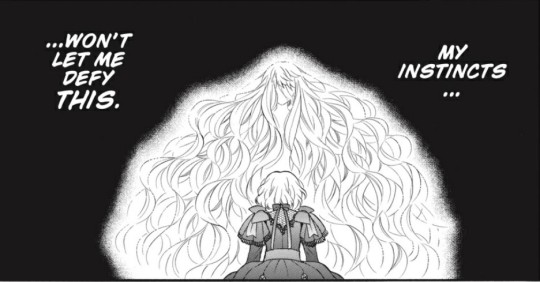
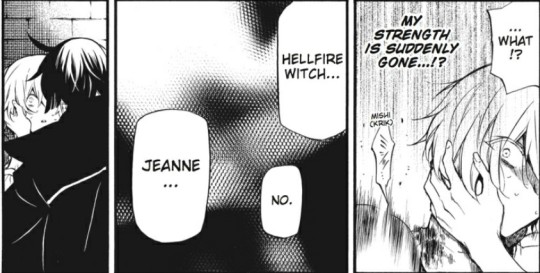
Both Chloé and Jeanne find themselves suddenly unable to thwart someone they normally wouldn’t have any trouble with at all and my theory is that Naenia and Vanitas are using a similar power (though Vanitas’s would stem from Vanitas of the Blue Moon while Naenia’s would be inherent).
This also emphasizes, to me, that Vanitas kissing Jeanne wasn’t just ... some random inclination. We know Vanitas of the Blue Moon was obsessed with Jeanne. We know Naenia, a powerful vampire, has the ability to halt Chloé in her tracks. Could this be indicating that there really is something wrong with Vanitas outside of already acknowledged misogyny? This could be further evidence that Vanitas really is switching personalities, that we aren’t just seeing him but someone else’s imprint on him. If so, it’s got to be his mark of possession that is causing it.
It’s something to keep an eye on at the very least but Vanitas’s kiss was reminiscent of Naenia’s ability, the ability that could very likely be messing with a vampire’s name or soul. I don’t think Vanitas was quite capable of that with Jeanne (unless we start to see otherwise) but symbolically I think that was exactly what he was going for.
We should also consider when Vanitas said this: “The onset of her illness is widening the area she can influence, and she’s pulling in every living creature within reach.”
I think that illness was caused by Naenia when she kissed her. Chloé was bleeding afterwards and only lost control afterwards as well, so whatever Naenia did to her it was potent.
Another thing I wonder about is Vanitas’s word use here:

Naenia has forced the “onset” on Chloé. “Onset” either means “the beginning of something” or an “assault or attack.” Either would make sense here but I’m inclined to think it means the beginning of what comes next: the destruction of the surrounding area. I can’t quite make out the Japanese text here, so if anyone has some further insight let me know!
We also finally have Naenia’s identify 100% confirmed: she is the queen, specifically Queen Faustina. I still have to wonder who the individual lying in the bed that Loki was talking to was though. I mean, is she dead? Is Naenia a wandering spirit? But if that’s the case how was she given physical form...?
Also, so far this means Naenia is not Vanitas of the Blue Moon as I had originally guessed. Of course, we don’t know for certain if VotBM is even dead. We see Misha in a flashback screaming at Vanitas for killing her but ... how dead is she? Perhaps she has merged with our Vanitas in some way...?
Still, Naenia, and therefore Queen Faustina, is ridiculously powerful. Actually, Queen Faustina seems a lot more powerful than Naenia:

She knocked Jean-Jacques aside without even a glance at him. Meanwhile, Naenia herself has to steal names in order to do much of anything. But! Something Vanitas said makes me wonder if there’s some kind of difference: “Chloé d’Apchier’s malnomen protects her by generating a sealed space.”
This seems to suggest that malnomen can be independent from the vampire, which would explain why Chloé seemed so unaffected by being cursed. Perhaps that is what’s going on with the queen as well? Naenia is both a part and separate from her? Once she’s destablilized, Naenia doesn’t recall anything whatsoever:

She’s less powerful now but Chloé is still very much a problem: she’s inadvertently destroying everything in the area.
Moving on to Vanitas and Noé now. A lot has happened with these two this chapter and there are a lot of parallels to previous chapters once more. For example, this idea of Vanitas falling and Noé being there to catch him, one of the biggest background themes of the series:
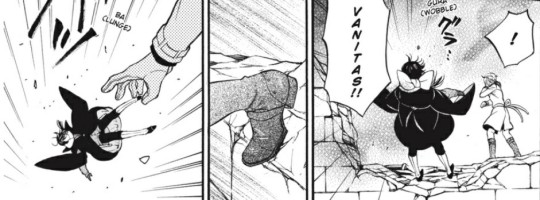
If we compare this to chapter 1 there are a lot of similarities visually. In chapter one, Vanitas is hit by some falling rubble, he loses consciousness, falls, and Noé leaps after him so he can save him. Here, Vanitas became ... lightheaded? He wasn’t obviously hit by anything at all. There’s some indication he’s still sick though, so that might be what did it. Either way, Noé goes leaping to his rescue once again without a second thought.
But there’s another parallel between this and chapter 1: both times, as Noé is falling, he’s greeted with a portent.
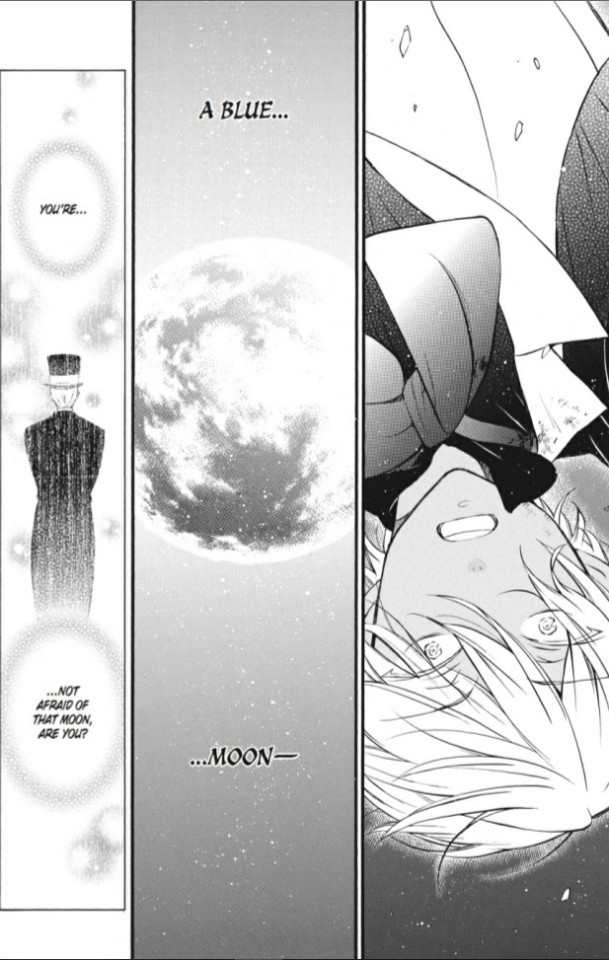

In chapter 1, the blue moon signifies he’s about to become very wrapped up in these matters, to say the least. It also features Teacher, remarking on how Noé isn’t the least bit afraid of it, to which Noé responds to his eyes it’s “quite beautiful.” In other words, as he’s falling he is given a sign: this person he’s chasing after is deeply connected to the blue moon and he’s going to get attached even if it doesn’t make any sense to, just as it makes no sense for a vampire of the red moon to chase after and admire the blue.
As for this chapter it’s less symbolic and more blatant. Noé is falling and trying to grab Vanitas once more. It takes a little longer this time but he still manages it. On the way, he’s greeted by a member of Charlatan who speaks an awful lot like Louis with the whole “You can’t save anyone” business. Maybe this is Louis; he seems to have an unexpected interest in Noé and wants him to hurry up and join them already. Who knows?
But the important bit (for now) is Noé is being given another sign: he can’t save Vanitas forever. Personally, I can’t help but wonder what Mochizuki is going to do in the end. Having the message of the series be “you can’t save everyone” is a harsh one (albeit true) and it would really change who Noé is as a person. Would she really go for that...?
At any rate, we’re spared having to deal with that for the time being because Noé manages to save him once more.
I also just want to point out that Noé is in business/battle mode once more. He’s making sure Vanitas is okay but he’s not exactly gentle about it:
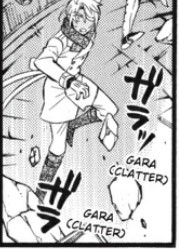
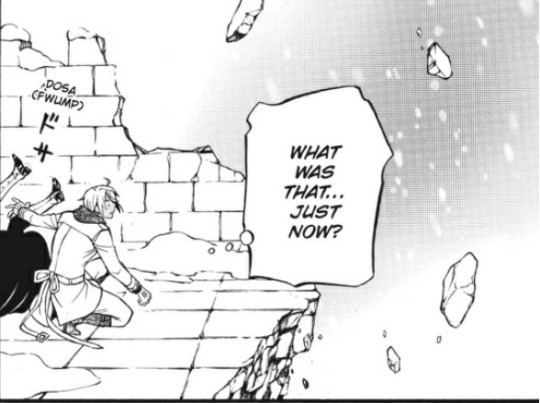
Definitely reminiscent of the catacombs arc once more. XD
Anyway, Vanitas definitely doesn’t seem to be doing well as we can see from Noé’s observation here:

So, his health seems iffy at best, I’d say and Naenia definitely had an effect on him. I think the sheer force of her ability, the strain of what they’re going to have to do to win, the fact he knows how hopeless the situation appears, is all starting to pile up, not to mention he was pretty ill only a few chapters ago.
Another parallel to the catacombs arc is that Vanitas doesn’t tell Noé what he knows until it’s a bit too late. The other problem is that Vanitas is often vague and Noé dislikes that as well but I digress.
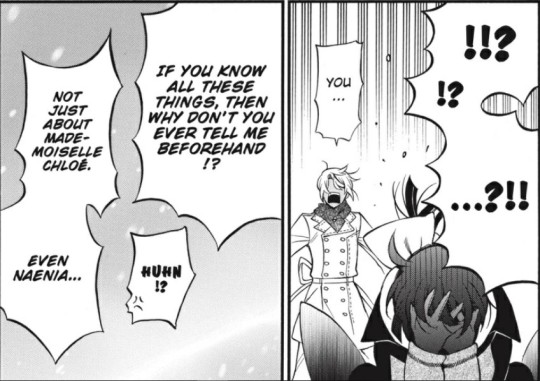
All of this leads to what I would say is hands down the most honest sentiment Vanitas has made this so far in this series.
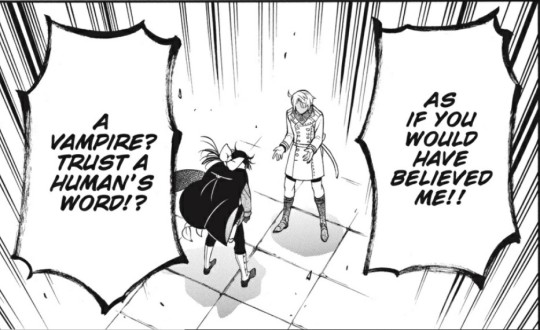
“Just how many times do you think I’ve nearly been killed by vampires?”
I mean, the fact he’s even telling Noé any of this is a testament to how frustrated and unwell he is; these are some of Vanitas’s most personal feelings. He told Noé once he thinks humans and vampires are equally rotten but I had wondered about that. Turns out, Vanitas does have issues with vampires specifically and that makes a lot more sense. Vampires murdered his family, which led to him being stuck with Moreau, which led him to being marked by a vampire, which may have then led to him having some other issues we don’t know about since we don’t know the full extent of what the mark of possession even does. Along the way he’s been abused by vampires and it’s all left a mark. As much as he likes Noé there’s still a part of him that can’t let go of what he’s learned in life: you can’t fully trust them.
There’s probably also the more basic stigma between vampires and humans to consider as well. Judging by how vampires treat dhampirs there may be some actual truth to what Vanitas is saying. Many vampires do not view humans all that highly and probably wouldn’t listen to them. I think this is all a big part of why Vanitas tries (but fails) to maintain some kind of distance between him and Noé. I’m curious to see how that continues from here on.
Anyway, one of his examples is Ruthven and we all know that Noé completely disagrees with how flippant Vanitas can be with his life, so I wasn’t surprised to see that lead to another headbutt. XD

But once again, Noé shows Vanitas that he’s different. Noé doesn’t forcibly drink his blood, Noé doesn’t belittle his desire for revenge, and now Noé proclaims to trust what Vanitas tells him.
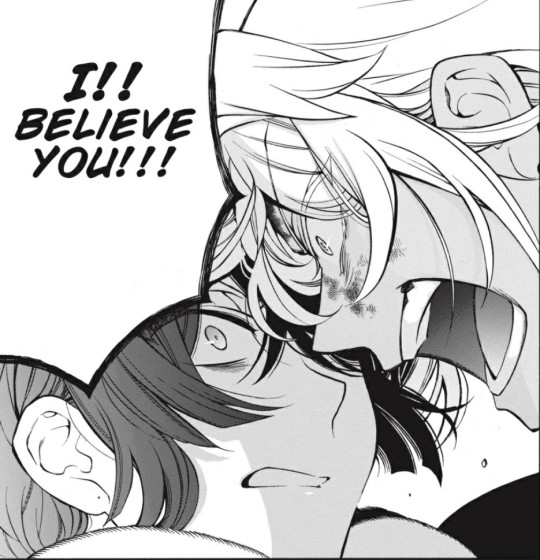
Is it any wonder Vanitas is having a hard time knowing what to do with this? XD Noé goes against everything he thinks he knows is true and after awhile anyone would grow tired of having to constantly reevaluate their own values and belief system. His declaration that Noé “really ticks him off” and the fact he’s kicking him (I mean, Noé started that with the headbutts, so...) is all symbolic of how hard a time he’s having with him. He doesn’t know what to make of Noé whatsoever but I am curious to see if he starts confiding his hunches to him from now on. That will let us know if any of this stuck.
After all that exertion yelling at Noé, Vanitas appears back to normal according to Noé:
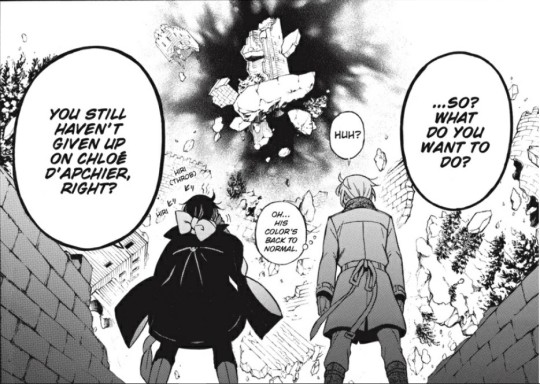
It’s all very “Amok Time.”
Anyway, if there’s one thing Vanitas knows for sure it’s that Noé refuses to give up about anything, probably the one thing he knows about Noé he’s semi comfortable with.
Of course, now we have Roland and the chasseurs finally joining the fray and I’m very curious to see how all that turns out! I’m sure Roland will dish out hugs or something equally repugnant to Vanitas. At least Noé will be happy. XD I’m also looking forward to finally seeing how he gets along with Astolfo; that’s been something I’ve wondered about for a while now!
199 notes
·
View notes
Text
Rural Transit Agencies Are Keeping People Alive
A few days after Jeanne McMillin started working as a dispatcher for Little Dixie Transit in the small southeastern Oklahoma town of Hugo nearly 20 years ago, she got a call from someone she described as “a little lady.”
Unbeknownst to McMillin, this lady had been a long-time rider. But McMillin was having a hard time getting all her information down. There were three different phones, two-way radios blaring constantly, and lots of activity in the office of people coming and going. It was all so much more chaotic than she expected when she took the job at the rural public transit agency. So McMillin asked the lady two or three times for her origin and destination, just to make sure she got it right.
“She kind of laughed,” McMillin recalled, “and said, ‘honey, are you new?’” McMillin chuckled at the recollection and the good-natured way the woman responded to her difficulties adjusting to the new job. “She could just tell.”
Little DIxie Transit is a public transportation agency, like New York City Transit or the LA Metro. But the similarities end there. It doesn’t have billions of dollars to spend every year or a staff of tens of thousands to serve those riders. In 2018, Little Dixie Transit had a $2 million budget and a staff of about two dozen. Rather than moving millions of people a day, they move hundreds. And when someone has somewhere to go, they call the landline and talk to someone like McMillin.
McMillin says you can learn an awful lot about a person simply by knowing where they’re going, something that Google, Apple, and countless tech companies have since discovered. A person’s travel habits are intimate, revealing details. Of course, McMillin wasn’t out to profit off that information. But it meant riders became much more than riders to her.
When that “little lady” would call, she’d tell McMillin she needed to go to Walmart or get her hair done. They’d chat about what they were making for dinner, when the lady’s children were coming to visit, and when something around the house broke that needed fixing.
“It became personal because you knew this person, her life, her activities, what she liked to do,” McMillin said. “You always thought she was going to be there, because she had always been there.” And Little Dixie Transit was always there for her, too.
*
The coronavirus crisis has had a powerful revealing effect on all aspects of American life. Most poignantly, it has shown us what is essential to our health and well-being. In big cities, public transportation systems that get essential workers where they need to go have received deserved recognition for their critical role in managing the crisis.
But the transit agencies across the country that serve rural populations have been less recognized. In large part, this is because many people don’t even know there’s such a thing as a rural transit agency. When most people think of public transit they think of trains and buses in dense urban areas. And when they think of rural areas, they picture people in cars driving everywhere.
But these services, which typically use smaller vans that seat a maximum of 14 people, are just as critical. They may serve fewer people, but are vital lifelines for the people who rely on them. Without these rural transit agencies, old folks would have to permanently leave their homes, the sick would routinely miss medical appointments, and some people would be stranded far from grocery stores and social events.
Motherboard spoke to four administrators of rural transit agencies and two statewide directors about the role they play in their communities for this article, and all of them stressed the underappreciated aspect of their services.
“We’re not a big urban system,” said Melissa Fesler of First Capital Trolley in Guthrie, Oklahoma. “We may not impact as many lives, but we do impact the lives of those we serve.”
In 2018, America’s 1,280 rural transit agencies made more than 125 million combined trips, according to data compiled by the American Public Transportation Association. The data doesn’t break down the purposes of those trips, but the rural transit employees Motherboard spoke to said they serve a variety of purposes. Some of their riders don’t own cars either for financial or health reasons. Others are on dialysis or receiving chemotherapy that require regular trips to health centers far from their homes and don’t have anyone else to provide that transportation. A significant portion of rural transit ridership tends to be elderly, allowing those customers to live in their homes longer than they otherwise could. Many rural agencies partner with drug courts to take people with suspended licenses to their appearances. Others bring children to school or activities while their parents are at work. Basically, if you cannot drive yourself for whatever reason, rural transit fills the gaps.
Rural transit’s proponents believe it is not merely a vital lifeline in times of crisis, but a key component to any recovery. “I always say there’s two reasons people ride the bus,” said executive director of Oklahoma Transit Association Mark Nestlen, “to make money and to spend money.” Even if that’s not strictly true, it’s a decent rule-of-thumb. For that reason, Nestlen calls transit “an economic development program that happens to have quality of life benefits.”
It’s important to not put too much stock in economic impact analyses, as they’re often little more than glorified guesswork. That being said, a host of studies have consistently found public transit in both rural and urban areas pays for itself by creating jobs, saving people money, improving health care access and outcomes, and saving lives. While the exact dollar benefits range greatly, studies consistently find rural transit is worth the money.
But these rural transit experts also said recent events have underscored how federal rules and funding formulas make it difficult to provide better or expanded service to those who need it. As a result, some are worried about what the future will bring.
“I’ve never experienced anything like what we have gone through in the last couple of months in almost 20 years of doing this work,” McMillin said, “and I’m very concerned about where we’re going to be at when we come out the other side.”
*
Like their urban counterparts, many rural transit agencies didn’t shut down when their respective states issued stay-at-home orders. The managers I spoke to all recounted similar thought processes, ones reminiscent of the mutual aid networks that have sprung up around the country. They asked themselves how they can still serve their communities even if it means adhering to social distancing and putting their community first, personal finances second.
Because many of their riders use the service to get to grocery stores, several rural agencies Motherboard spoke to quickly pivoted to grocery and meal delivery. Kari Ruse, transit manager at the Nebraska Department of Transportation, said many of the rural agencies in her state are now de facto grocery delivery services, free of charge.
So too is Goose Creek Transit in Sheridan, Wyoming, which primarily serves the town’s elderly population and whose goal, according to manager Steve Ainslie, is to enable seniors to live in their homes for as long as possible. Normally, that means bringing seniors to and from the senior center, but with social distancing rules in place, Goose Creek Transit has become their go-to Walmart delivery service. Ainslie decided to waive the $2.50 fare because “it just didn’t seem like the right idea to ask” for that money.
Not only did many rural transit agencies stay open, but they are also facing expenses and various inefficiencies that are pushing their budgets. Most obviously, they had to buy personal protective equipment for their drivers—many of whom are themselves senior citizens supplementing retirement income—and gallons upon gallons of hand sanitizer and other cleaning supplies, expenses they either didn’t have before the outbreak or were much lower prior to the crisis. Fesler of First Capital Transit told Motherboard she’s been spending $80 per gallon of hand sanitizer, not to mention sanitizing all 60 vehicles between each passenger.

Image: Oklahoma Transit Association
Some rural transit agencies have it better than big city agencies that typically move millions of people, at least financially speaking. Although agencies big and small have seen ridership plummet, the CARES Act, which provided $25 billion for public transportation, will cover agency shortfalls in the 10 largest transit regions for an average of 5.4 to 8.3 months, according to an analysis by the non-profit think tank TransitCenter. For the rest of the country’s transit systems, CARES Act funding will last an average of 12.6 to 20.8 months.
This is because the CARES Act uses the same federal funding formulas as the feds do in normal times to divvy up that $25 billion, which, as Ben Fried of TransitCenter told Motherboard, “shortchange transit agencies in large cities, distributing less money relative to their share of national ridership.”
However, TransitCenter notes these are just averages, and some rural agencies are in just as dire funding straits as big city agencies due to the vagaries of these broad formulas.
In order to receive money from the feds, rural transit agencies have to scrounge up some cash on their own. For operating expenses, agencies have to match the federal contribution dollar for dollar, while administrative and capital expenses are one local dollar for every four federal ones (the CARES Act money doesn’t require a local match).
Some rural agencies get that local match from city or state tax revenues. Others raise the money on their own by providing contract services for non-emergency medical transportation, drug courts, and other local government agencies for their transportation needs.
This is a cumbersome, inexact process that works better for some rural agencies than others during normal times. Because the CARES Act uses the same basic formulas, the coronavirus crisis has therefore only exacerbated those differences, meaning those who normally struggle to put together local match funding are in even worse shape during the crisis.
First, those federal funds for rural transit agencies—which amounted to $740 million for rural transit agencies this fiscal year before the CARES Act stimulus—are appropriated based on performance metrics. The two most important metrics are how many trips the agencies provide and how many miles the vehicles travel while picking up and dropping off riders. Both of those statistics have plummeted nationwide in recent weeks.
Plus, agencies that used to transport multiple passengers at a time have changed their policies to enable social distancing. Now, they have either severely limited vehicle capacity or stopped taking multiple passengers entirely. This adds vehicle miles travelled—and the related fuel and maintenance expenses—while providing service for fewer people, making their operations appear less efficient, which hurts their federal outlay.
On top of that, those same performance measures are the ones transit administrators show to local politicians to demonstrate they’re providing a valuable service to the community. This helps justify the local match funding so they can in turn receive the federal funds. But, with tax revenues plummeting, will local or state governments continue providing that funding, especially if rural transit agency’s metrics look so bad on paper?
Even the agencies that raise their own matching funds are worried. Little Dixie Transit, for example, gets most of its matching funds through non-emergency medical transportation contracts that pay for Medicaid patients to get to their doctor’s appointments. In rural areas, those trips can take hours each way. Dialysis and chemotherapy patients are still going to their appointments because they’re medically necessary, but McMillin estimates about 75 percent of non-emergency medical trips have been cancelled. As of the end of April, she has no idea how she will make up for that lost revenue.
*
In keeping with the vagaries of federal funding formulas, some agencies are more worried about the future than others. Ruse, for example, thinks the $27 million Nebraska got through the CARES Act will help see Nebraska’s transit agencies through the difficult months ahead. Others are hoping this crisis spurs more fundamental changes in how rural transit is funded so they aren’t scrounging for dollars every year to get that federal match.
Depending on the specifics, this would likely be a great development, Nestlen believes.
“Congress never sat down at the table and said ‘let’s develop a rural transit program. What should it look like?’ They sat down at a table and said here’s the urban transit program…we’re going to have everything be the same and just put it in rural," he said. "When you do that, you’re going to put a square peg into a round hole.”
It is to their credit that the rural transit agencies do not operate like square pegs in round holes. To a person, the people interviewed for this article were proud to be serving their communities in these difficult times. Some said it reminded them why they got into this line of work to begin with. Fesler had a driver thank her for assigning her to deliver meals to seniors, because she was just grateful to be making a difference at a time where so many of us feel so isolated and powerless, the exact opposite of what a good transit system does for its passengers.
One of the people who has been reminded what she got into this line of work lately is McMillin. Seven or eight years into her tenure at Little Dixie Transit, the “little lady” who welcomed her to the new job passed away. McMillin and a half-dozen other Little Dixie Transit employees went to her funeral. After all, they spoke to her almost every day for years. They knew which days she would be calling and which days she wouldn't. It was those kinds of experiences that got McMillin hooked to the job, helping people one at a time. Never before, she said, has that been more important.
“I can’t tell you,” she added almost as an afterthought, “how many people we transport where we will be the only people they see any given day.”
Rural Transit Agencies Are Keeping People Alive syndicated from https://triviaqaweb.wordpress.com/feed/
0 notes
Photo










[07.29.17] i recognize that i am ridiculously behind on writing this post, so for those of you who have still been keeping along, i am very sorry! i can explain! let’s rewind.
the in-limbo period of time that i had in between japan and iceland was chaotic, to say the least. consumed with fixing things around the house (our ac broke so i had to readjust the fan unit outside), visiting mom at work, and gearing up for iceland, i got really busy. i was always hoping to write about my downtime in minnesota because, after all, it would’ve been one of the highlights of the summer (I LOVE MINNESOTA). ultimately, i just never had the chance.
in either case, wifi in iceland turned out to be far more limited than i had originally predicted. since i slept in my car most of the nights (more on that later), the only wifi i had access to was when i was filling up at a gas station. even those connections were weak, so the prospect of uploading any text entries, let alone photographs, were minimal. i was sad to admit to myself that the trip couldn’t be shared with you all as i lived it. instead, it had to be relayed after the fact upon my return to the states.
now that things have calmed down a bit and i’m living a slow and sleepy minnesota life, i can take some time to update you and share with you some of the trip’s highlights. though it’s pretty difficult to walk you through 11 days in iceland in one post, i’ll try to do my best.
it makes sense to start with the disappointing email i received from a mycology professor upon taxiing to my gate in iceland, saying that he had decided to take a last minute vacation and couldn’t meet up with me. understandably, these sorts of things happen, but i was pretty bummed that one of my connections had to back out. luckily, my other connections (who were a married couple at the iceland academy of the arts) and i were to meet towards the end of my trip, so in a matter of minutes, i was a free bird with no agenda. as such, i landed in iceland with a certain restlessness that, for some reason, urged me to just hit the road as quickly as i could.
my shuttle bus from the airport to my rental car location was 6 hours late, so i had to bum around the airport. i know – first world problems – but with that agitation that was boiling inside of me to just get rolling, i started to go nuts. nonetheless, several hours later, a sweetheart girl, who couldn’t be more than 19 years old, picked me up. she insisted on carrying my duffel bag and backpack. i could tell that she could tell that i felt a little weird about it. seemingly reciting a speech that she likely gave to many idiotic american males before me, she explained to me how iceland is one of the most feminist, forward-looking, and optimistic countries. as we drove off in the 14 passenger van and she slam-shifted the burly van’s gear shift, i couldn’t help but notice that she was enjoying my slight surprise.
well, i picked up my rental car (a five-speed fiat panda that was a joke compared to my female friend’s bus), bought a map, and hit the road, traveling north towards reykjavik. the only plan i had decided on was to drive through reykjavik and ignore the city, promising myself that i’d spend ample time there upon my return. and so, i kept driving north on the ring road (highway number 1), taking my time, stopping every couple of kilometers or so to soak up the scenery. i took about an hour to stop at a “bonus,” which was the equivalent of a small-sized costco, to pick up sandwich meats, bread, and preservable food. i had heard the horror stories about the food prices in iceland, so i made it a goal to live off of my own concoctions for at least the first six days.
since i knew i would be living out of the panda for the majority of my eleven day trip, i made it a goal to compartmentalize the car into different zones. blame it on my architectural brain, or occasional obsession with specificity, but i had to get comfortable in the car.
the front passenger seat was dedicated to brushing my teeth, trimming my beard, making coffee, and changing clothes, while the driver’s seat was for… driving. nothing too weird up in the first half of the panda.
the rear seat was dedicated for sleeping, but only sort of. since my rather large body didn’t fit easily back there, i would sleep on my left side and swing my legs up through the center console and rest them in the passenger seat. when i’d get tired of this position in the middle of the night, i’d switch sides and sleep on my right side. strangely enough, it felt too awkward to let my feet rest in the driver’s seat when i was in this position, but after the third or fourth night, i found it pretty comfortable to hang my foot off the gear lever if i parked the car in first, third, or fifth. the miserable techniques of an aspiring architect.
the rear hatch was dedicated solely to food, as i ate out of a ‘kitchen’ that i built in the trunk of the panda. two cardboard boxes housed all the plastic cutlery, toilet paper, and rolls of paper towels that i had stolen from the airport. after all, i had to do something productive with my 6+ hours, and i had made the mistake of finishing my book on the plane. i kept all my deli meats, cheeses, jelly, and spreads inside high quality ziploc bags inside an equally heavy duty plastic bag, which i hung from the exterior rear windshield wiper of the panda. this way, i could prevent insect buildup. in addition, the weather was pretty cold overall, so i took advantage of the icy rain and cold wind while i drove and slept to naturally refrigerate my food. with the exception of some dirt that entered the bag on the eastern parts of iceland, this technique worked out pretty well for me.
to compliment my weird program divisions inside the panda, i developed a strict routine of eating, resting, refilling fuel, and begging for free hot water for my french press that i had brought along. strangely enough, it was through this chronology that i was able to tell what time of the day it was, since the all-day brightness was so disorienting. all in all, i charted my travels, favorite locations, and quirky experiences on the aforementioned map, notating for myself as many things as i could recall from the day. i’m hoping to pin up this map on my apartment’s wall when i return to pittsburgh.
i’m going to sound stupid if i try to describe what i saw - it was just too beautiful. color was surreal, mostly because the abundant grays made everything else feel so saturated and accented. while i’ll let the photographs speak for themselves (there’s just no way i can try to explain how beautiful iceland’s landscapes actually are), i’ll share with you two existential moments that i had along my travels, which adequately color the trip for what it was. the first involves a bunch of multicolored sheep at 4am, and the second involves a hitchhiker that i met along the road.
after around the fifth night, having a full night’s rest became a great difficulty, and i started to have lucid dreams as i fell in and out of sleep. this particular night, i woke up to find that what i had thought was an ingenious plan to hang black tshirts from my rollup windows to block sunlight was actually a horrible decision. a zillion mosquitos were in my car. not 10, not 100. a bagilion. just like the horror movies. i had idiotically parked near a marsh/swamp for the night, and all the stupid insects had crawled through the gaps in the windows. here’s an excerpt from an email i wrote to an important friend about the event, which adequately captures my inner turmoil:
despite the success of this leg of the trip with camping inside the car, last night was a disaster. i woke up to ten thousand mosquitoes inside the panda at 445a because i'm an idiot and fool and i left the windows open because i'm an idiot and fool. i knew nothing else than to drive like a madman with windows down for two hours to get rid of them, eventually ending up in little town. weather is overwhelmingly foggy and don’t want to drive because it's a bit unsafe. i can't see these ****ing suicidal sheep that come out of god's **s onto the road and baaaaaa and bleep around. and the farmers spray paint their butts to know whose is whose so i just see these little pink and blue and red butts galloping towards and away from me through the fog. it's slightly poetic but also so maddening. and i guess, at this point, i break down, knowing that this hell is sent from the gods and that they're rightfully directed at me. ***k ***k ***k stupid sheep ***k.
i don’t think i can look at sheep in the same way, to be honest.
several days later, on a random impulse, i decided to pickup a hitchhiker that i found just outside of hella, iceland. jeanne, who turned out to be a total sweetheart, was french-canadian. we stuck together for the whole day, visited a couple of waterfalls, and talked about the weirdest stuff. later, we stopped by the side of the road and pet some random horses. wouldn’t you? it’s amazing how comfortable you can get with someone you don’t know and know you likely won’t see again, simply in light of the fact that you are both blank slates to each other. you have nothing to lose. so those several hours we spent together were really nice.
my time with jeanne also made me realize how lonely a solo traveler can feel in iceland. again – first world problems – but a reality for me, nonetheless. iceland, no matter how grateful i was for the experience, should’ve been absorbed with someone else, at the very least. it was just too beautiful and esoteric to have been lived through alone. i find that relaying my experiences with my mom and minnesota friends has become quite difficult, because the picturesque scenery i’m trying to depict seem exaggerated. and as cathartic and uplifting as iceland was for my health, i wish i had shared that with someone else as well.
when i finally finished the long loop around iceland, i had three to four days to soak up reykjavik, so i checked in at the cheapest hostel i could find and explored the city by foot. i had great beer, good grocery-store food, and occasional splurges on drip coffee. it was during this time that the married couple i was scheduled to meet informed me of a sudden family emergency – one which forced them to fly out of the country last minute.
this brings me to the guilt that i felt about missing out on my mycology connections in iceland, despite how much it was out of my control. i keep asking myself: what if i had planned for just one more resource? was three really enough? of course, i know that these things happen, and that i should learn from this, but an underlying sense of embarrassment still resides. originally, i had hoped to visit japan and iceland to soak up 50% of research and knowledge from both, but i’m now realizing how naïve that was. iceland, in the end, turned out to compliment japan as a therapeutic release from my everyday worries – something that arguably is extremely important, especially as i delve into my fifth and final year of school – but also something which admittedly steers away from the original thesis-based proposal i had put forward to carnegie mellon.
i was lucky enough to fly through boston, both on my way to and from iceland, and see several important people in my life. i stayed with nick, who was my best friend and roommate at grinnell college before i transferred. though i wasn’t able to see the wonderful temple rea, i got to annoy his awesome sister, walton, for an afternoon. i even got to see the handsome and well-dressed kyle wing in the city, which was a blast. the rest of my time was spent soaking up the boston public library, perusing random bookstores, and gawking at MIT’s media lab and campus. ultimately, boston was a wonderful reprise for me as i get ready to return to pittsburgh.
i have spend quite some time wondering if i should keep this blog going or not. i likely will for thesis, but i’m not sure if i’ll start a new one or just continue on this platform. more on that after i talk with my advisers on the matter. i think i need a springboard for thoughts, i just don’t know if i should start over or not.
nonetheless, i’m so incredibly grateful for the opportunities i’ve had throughout this summer to travel, learn, and live. i still cannot believe how this fantasy became a reality, so to my donors, department, university, and mom’s patience, thank you.
1 note
·
View note
Text
GOODBYE DEAR NICKY
I’m writing this now before I have time to think logically. I feel so regally let down by time and fate, that it’s difficult to do much more than marvel at the preposterous puppetmasters that act on whims and fancy to mess with our visions of perfection. That’s me-me-me/ it’s all about me railing the fates. It helps a lot to blast the Kinks and write down some thoughts, so bear with me please. I know you all are going have great memories of him in the eels and the Cramps- go to it, but for me it’s the time before any band stuff, 40 years ago, and most recent history, when he picked up and called me on Feb 4, 2017. This is a start on a longer entry for kicksville66 I’ll write some more about meeting up on October 13 of last year at Franklin Castle, and him doing his darndest to A&R a young band he knew, Archie & the Bunkers for Norton. For now, here’s what I’ve got. Read it and weep.
****************************************************
I last saw Nicky – Nick Knox- - who most you know as the drummer of note for 70’s bands the electric eels and the Cramps, last weekend, in intensive care at the Cleveland Clinic. It was heartbreaking, as I had spent a few great days with him at the end of April, when I went out to Ohio to hunt down photos from George Shuba and meet with Wally Bryson regarding the record we were about to issue on his great band, the Choir. Nicky had seemed well and happy at that time, all charged up and ready to go. We had a ball with George, and it was great listening to the two of them talking about every rock n roll show that had ever happened in Cleveland, it seems.
Somebody asked about my friendship with Nicky, how it all happened. Some of you may not know that we were friends before either of us were in bands; that after summer of ’77, we didn’t see each other for 40 years; and that we became great friends again last year.
I received a phone call from Nicky, out of the blue, a year and a half ago, three months after Billy’s passing and four months after my own brain surgery. When he said it was Nick calling, I thought it was Nick Tosches, who was the only Nick I knew of. He was offering condolences and I thought, why would Nick T say this stuff- he had been at the funeral. So I asked “Who is this?” And he said “It’s Nicky, Miriam- Nick Knox.” I nearly fell out of my chair. I had not heard from him in 40 years.
I was in the midst of what you might call high grief, complicated by thick sleepiness and post-gamma knife brain fog that came, as predicted, after the new year. It had me in a state of panic and fear, matched with various parts of loneliness and despair, and narcoleptic sleepiness. To say I was despondent is putting it lightly. That phone call saved me from falling into a well.
After that first call, we soon came up a plan to talk on the phone every day at 11:11 AM, and we stuck with that, basically a mutual check-up call, always cheerful, at least on alternating sides. He knew, somehow, what I was dealing with, and said that I was, “like the little sister I never had”. He ended every call the same way, “Miriam, I love you, I love you, I love you.” I have a feeling he dispensed the love x 3 line to his many younger relatives who adored him, as well, because it’s the kind of thing you’d tell a child, and there’s some baby in each of us when we’re not feeling perfect. I looked forward to the daily check up calls, and I soon realized that he needed the pep talks as well.
Nicky and I had been friends since the early 70’s, when my sis Helen and I started coming into Cleveland to see bands. In 1973, we saw the Dolls at the Allen Theatre and then the Stooges and Slade in January of ’74. When I say “we”, I mean every Cleveland no-count between the ages of 14 and 24. It seems that every person in NE Ohio who ended up in a band was at those shows. I cover a lot of this stuff in my Kicksville66 blog, so let me just get to recent happenings.
Nicky was a voracious reader- he read every rock n roll biography and autobiography – checked out from the library, and he had the benefit of a near-photographic memory, and an astonishing ability to recall dates and places, and really minute details. More than any book, though, he was addicted, still, to his beloved MAD magazine, and also to the little game schedule of Indians games. He gave me one of those pocket scheds and said, “I am not available at game time.” So strict!
A friend gave me back a letter that I wrote in 1975 where I describe a trip to New York with a carload of friends, including Stiv, Babs, James and “Nick who looks like a Kink”. The Kinks were by far his favorite band, and I gave him the Anthology CD set for his birthday this year (for the car). Like myself, he had seen them at their first appearance in Cleveland in December 1975, where he got the famous Mad magazine clipping autographed by the Davies brothers. He had laminated it with the ticket stub and it had vanished in with his 45s for decades. It turned up this spring and he brought out to show me in February. I took a photo of it, enlarged it, and Dave Davies autographed for him it again on April 3. It meant a lot to him, a real lot. The Kinks thing runs so deep in all serious fans, and for myself, speaking with Nicky every day reminded me of the really fantastic days of fandom and record hoarding, and it set me on a return mission to mayhem with them.
Nicky hated attention from strangers, even when they were well meaning fans. When he came out of the woodwork to DJ that first time Oct. 13, then on Feb 23 and again on April 28, he refused photos and autographs from nearly everyone. What he did take to like a fish to water was DJ’ing. When we were goofing around about having a DJ battle, he called in a panic to say he couldn’t find his copy of the Grasshoppers “Mod Sox” and could I bring along a copy. I thought, WOW! The Grasshoppers, this is gonna be fun! And it surely was. He brought along a lot of surprises, and always the rockers- for the last gig, he asked, “Can I just bring all Larry Williams?” The end of the night at that gig, the room was empty except for myself and Kitty and Pascal, our friends from Franklin Castle. The record players were still set up and the lights were low, and I asked him if he wanted to spin some more. He smiled and said, “Ooohhhh, YES”, and I offered to help. “Go dance,” he said, and for a long while, it was magic. Kitty and Pascal and I dancing along the black and white tile patterned floor, with twinkling lights and us cheering Nicky on with each new record. We’d wave at him, and he’d wave back. It was one of the happiest moments ever, being back in the land that time forgot, and seeing my old friend having a great time—with 45’s in hand. That night there was a full moon- all four of us thought that made it extra special.
Many people will have great memories of Nicky. These were some of mine, set down on the morning after his passing. I thank God that Nicky was a friend of mine. He was one of the kindest, funniest, most amazing human beings ever and I was very lucky to have been in his orbit.
Much love to Jeanne and the family, who he loved so much, and who have treated me with such love. And also, love to Ernie.
Miriam Lynna (on FB post)
https://www.facebook.com/miriam.linna/posts/10155280546612016
0 notes
Text
Rich Buyers Are Pushing Rural Hospitals to a Controversial Practice
https://healthandfitnessrecipes.com/?p=5670
CEDARVILLE, Calif.—Beau Gertz faced a crowd of worried locals at the town senior center, hoping to sell them on his vision for their long-beloved—but now bankrupt—hospital.
In worn blue jeans and an untucked shirt, the bearded entrepreneur from Denver pledged at a town-hall meeting in March to revive the Surprise Valley Community Hospital—a place many in the audience counted on to set their broken bones, stitch up cattle-tagging cuts, and tend to aging loved ones.
Gertz said that if they voted on Tuesday to let him buy their tiny public hospital, he would retain such vital services. Better still, he said, he’d like to open a “wellness center” to attract well-heeled outsiders—one that would offer telehealth, addiction treatment, physical therapy, genetic testing, intravenous vitamin infusions, and even massages. Cedarville’s failing hospital, now at least $4 million in debt, would not just bounce back but thrive, he said.
Gertz, 34, a former weightlifter who runs clinical-lab and nutraceutical companies, unveiled his plan to pay for it: He’d use the 26-bed hospital to bill insurers for lab tests regardless of where patients lived. Through telemedicine technology, doctors working for Surprise Valley could order tests for people who’d never set foot there.
To some of the 100 or so people at the meeting that night, Gertz’s plan offered hope. To others, it sounded suspiciously familiar: Just months before, another out-of-towner had proposed a similar deal—only to disappear.
Outsiders “come in and promise the moon,” says Jeanne Goldman, 72, a retired businesswoman. “The [hospital’s] board is just so desperate with all the debt, and they pray this angel’s going to come along and fix it. If this was a shoe store in Surprise Valley, I could care less, but it’s a hospital.”
The woes of Surprise Valley Community Hospital reflect an increasingly brutal environment for America’s rural hospitals, which are disappearing by the dozens amid declining populations, economic troubles, corporate consolidation and, sometimes, self-inflicted wounds.
Nationwide, 83 of 2,375 rural hospitals have closed since 2010, according to the North Carolina Rural Health Research Program. These often-remote hospitals—some with 10, 15, 25 beds—have been targeted by management companies or potential buyers who promise much but often deliver little while lining their own pockets, according to allegations in court cases, a Missouri state audit, and media reports.
Enticed by such outsiders, some struggling rural hospitals around the country have embraced lab billing for faraway patients as a rescue plan. That’s because Medicare and commercial insurers tend to pay more for tests to sustain endangered rural hospitals compared with urban hospitals and especially outpatient labs. In general, this kind of remote billing is controversial and legally murky, and it recently has resulted in allegations of fraud in several states, according to government documents and media reports.
Rural hospital boards, however, tend not to have expertise in the health-care business. The president of Surprise Valley Community’s board, for instance, is a rancher. Another board member owns a local motel; a third, a construction company. That lack of experience “leaves them vulnerable in many cases,” says Terry Hill of the nonprofit National Rural Health Resource Center, based in Duluth, Minnesota.
Seeking to distinguish himself from other would-be rescuers who ran into legal trouble, Gertz described his proposal to residents as perfectly legal—a legitimate use of telemedicine, essentially remote treatment via electronic communication such as video. “If you do it correctly,” he said in an interview with Kaiser Health News, “there is a nice profit margin. There [are] extra visits you can get from telemedicine but ... it has to be billed correctly and it can’t be abused.”
Jeanne Goldman talks with Beau Gertz after the town-hall meeting. (Heidi de Marco / KHN)
Gertz runs several companies—founded within the last four years—including two labs, SeroDynamics and Cadira Labs, as well as a wellness company called CadiraMD.
He pledged in court documents to buy the bankrupt hospital for $4 million and cover its debts. In a public meeting, he also said he had loaned the hospital $750,000 and lined up a $4 billion New York company as a financial backer. Kaiser Health News was unable to locate the company under the name Gertz cited in the meeting, Next Genesis Development Group. He did not respond to emails seeking clarification on the issue.
Gertz, who acknowledged that he had never before run a hospital, was asked at the same gathering whether he had disclosed his “financials” to the hospital board. “As a private entity, I don’t have to show my financials and I have not provided my financials to the board,” he replied.
It was not clear whether board members had ever asked. Surprise Valley Health Care District Board President John Erquiaga declined to comment.
Surrounded by the Warner and Modoc mountains and forests in California’s northeastern corner, Surprise Valley is home to four small communities. The largest is Cedarville, population 514, at last count.
The valley, covered in sagebrush and greasewood, is part of Modoc County, one of California’s poorest, with a median income of about $30,000. The closest hospital with an emergency room is roughly 25 miles away, over a mountain pass.
One of hundreds of rural hospitals built with help from the 1946 federal Hill-Burton Act, the Surprise Valley hospital opened in 1952 to serve a thriving ranching community. But it has struggled since, closing in 1981, reopening as a health clinic in 1985, then reconverting to a hospital in 1986.
A county grand jury report in 2014-15 found that “mismanagement of the [hospital district] has been evident for at least the past five years.”
By last summer, those in charge didn’t seem up to the task of running a modern hospital. By then, it was hardly a hospital at all. Crushed by debt, it primarily offered nursing-home care, an emergency room, a volunteer ambulance service and just one acute care bed, with three others available if needed.
When state inspectors arrived last June, they found chaos. The hospital’s chief nursing officer resigned during the inspection. Staffers reported unpaid checks to vendors hidden in drawers. Inspectors learned that the hospital had sent home temporary nurses because it couldn’t pay them, according to their report.
The hospital’s then-chief administrator, Richard Cornwell—who staffers said had instructed them to hide the checks, according to the report—had taken a leave of absence and was nowhere to be found. Cornwell, a health-care accountant from Montana, was later fired and replaced with the hospital’s lab director, who in turn resigned, according to public records. Reached by Kaiser Health News, Cornwell declined to comment.
Federal regulators suspended Medicare and Medicaid payments to the hospital—a rarely invoked financial penalty—over concerns about patient care. Those payments have since been reinstated, but a follow-up state inspection in November 2017 identified more patient care concerns.
Infighting ensued, with some residents fiercely committed to keeping the hospital open and others favoring closure, perhaps replacing it with a small clinic. Jean Bilodeaux, 74, a local journalist, says board members often kept the public in the dark, failing to show up for their own meetings and sometimes making decisions outside public view.
When Bilodeaux raised questions about the hospital’s finances in the Modoc County Record, a weekly newspaper, she recalled, board members “started screaming at me,” she said. Now “I don’t even step foot in that hospital.”
Ben Zandstra, 65, a pastor in Cedarville, says that while Cornwell was in charge, he too got a chilly reception at the hospital, where he had long played guitar for patients on Christmas Eve. “I became persona non grata. It’s the most divisive thing I’ve seen in the years I’ve lived here.”
Even residents who say they have experienced poor care at Surprise Valley Community believe its continued existence in some form is crucial—for its 50 or so jobs, for its ER, and because it puts the region on the map.
Eric Shpilman, 61, a retired probation officer, says his now-deceased wife received “unspeakable” treatment at Surprise Valley. But to shut it down? “It would take out the heart of Surprise Valley, the heart out of Cedarville.”
Last summer, the board turned to an outside management company for help.
Jorge Perez, the CEO of Kansas City–based EmpowerHMS—which promises on its website to “rescue rural hospitals”—agreed to take over Surprise Valley’s debt and operate the hospital for three years, according to a management agreement with the board.
In the two months after EmpowerHMS took over management, Surprise Valley’s revenue more than doubled, according to financial documents provided by the hospital.
Then, according to hospital officials’ public statements, the company stopped making the promised payments, and they haven’t been able to contact EmpowerHMS or Perez since. In January, when Surprise Valley filed for bankruptcy, documents filed in court said EmpowerHMS had “abandoned” the hospital.
Around the time Perez took over, he and companies with which he was involved were dogged by allegations of improper laboratory billing at facilities in Mississippi, Florida, Oklahoma, and Missouri, according to ongoing lawsuits by insurers and others, a state audit, and media reports. Missouri’s attorney general in May opened an investigation into one of the hospitals Perez managed, and the Democratic Senator Claire McCaskill of Missouri recently called for a federal investigation into lab-billing practices at one of the hospitals.
Cows roam in Cedarville, California. (Heidi de Marco / KHN)
Medicare rules and commercial insurance contracts, with some exceptions, require people to be treated on an inpatient or outpatient basis by the hospitals that are billing for their lab tests. But insurers have alleged in court documents that hospitals Perez was involved with billed for tests—to the tune of at least $175 million—on patients never seen at those facilities. Perez has maintained that what he is doing is legal and that it generates revenue that rural hospitals desperately need, according to Side Effects Public Media.
Experts say insurers are catching on to voluminous billing by hospitals in communities that typically have generated a tiny number of tests. At one Sonoma County district hospital not associated with Perez, an insurer recently demanded repayment for $13.5 million in suspect billings, forcing the hospital to suspend the lucrative program and put itself up for sale.
Lab tests for out-of-town patients have “been a growing scheme in the last year, slightly longer,” said Karen Weintraub, the executive vice president of Health-Care Fraud Shield, which consults for insurers. “There’s an incentive to bill for things not necessary or even services not rendered. It also may not be proper based on contracts with insurers. The dollars are getting large.”
Some residents were aware of controversy surrounding Perez and his companies and said they tried to warn the hospital district board. “All they wanted to hear was, ‘We will pay the bills,’” Bilodeaux said.
Neither Perez nor EmpowerHMS returned requests for comment. However, Michael Murtha, the president of the National Alliance for Rural Hospitals, said in an email that he was responding on behalf of Perez, who chairs the coalition’s board.
“The mission to rescue rural hospitals and set them on a path of sustainability is a difficult undertaking, and it would be a disservice to their communities to preclude struggling facilities from availing themselves of every legal and regulatory means to generate badly needed revenue,” Murtha wrote, in part.
“Such pioneering efforts are not always welcomed by those who have benefited from the status quo,” he said.
Regarding Perez’s role at Surprise Valley, Murtha wrote that Perez tried to help save the facility by “effectively” donating over $250,000 but then discovered it faced “more challenges than had been initially realized.” Murtha said Perez worked to attract others who might be better able to help the hospital.
One of those “others” in Perez’s orbit was Gertz, the Denver entrepreneur, who arrived in Surprise Valley several months ago.
The Denver executive told residents and Kaiser Health News that he operated a lab that previously performed tests for hospitals owned or managed by Perez’s companies. At one hospital board meeting, Gertz also said he had handled marketing for Perez companies for one-and-a-half years.
However, he said he had parted ways with Perez after learning of his controversial dealings in other states, and Gertz said Perez now owes him more than $14 million. (Gertz and his companies have not been named as defendants in lawsuits reviewed by Kaiser Health News involving Perez and his companies.)
“I come in with a certain guilt by association,” he told the Modoc County Board of Supervisors in April, according to a recording of the meeting. But Gertz sought to assuage any concerns, telling the supervisors he had a “passion” for rural life. He’d grown up on a farm, he said, where he “hung out with the chickens” and cleaned the stables every morning.
Gertz said his plan was different from Perez’s and legal because the hospital and one of his Denver labs, SeroDynamics, had become one business. With the hospital board’s approval earlier this year, he loaned the district $2.5 million for it to buy SeroDynamics—effectively an advance on the hospital’s purchase price of $4 million, according to bankruptcy court documents. SeroDynamics’ website now proclaims the lab a “wholly-owned subsidiary” of the Surprise Valley hospital, with “national reach.”
Robert Michel, a clinical laboratory-management consultant who learned of the terms of the transaction from a reporter, offered a critical assessment. “The essence of this arrangement is to use the hospital’s existing managed-care contracts with generous payment terms for lab tests as a vehicle to bill for claims in other states,” said Michel, the founder and president of a trade magazine for the lab industry. This arrangement “should ring all sorts of bells” for the hospital board, he said.
For now, Gertz has said, dollars are flowing in. According to the journalist Jean Bilodeaux, Gertz phoned in to a Surprise Valley hospital board meeting in May to report that the lab billing so far had netted about $300,000. According to bankruptcy court documents, 80 percent of the profits will go to his companies, 20 percent to the hospital.
Those are terms some in Surprise Valley are willing to live with.
The next step, for Gertz, is taking ownership of Surprise Valley’s entire operation. For the roughly 1,500 district residents, voting no on Tuesday almost certainly means closure, leaving taxpayers with potentially more debt, including any money they may owe Gertz.
That is good enough reason to go with the Denver entrepreneur, said the acting hospital administrator Bill Bostic.
“He’s got something we haven’t got—which is money,” Bostic said.
This post appears courtesy of Kaiser Health News.
https://cdn.theatlantic.com/assets/media/img/mt/2018/05/rural_hospital_12_preview/lead_960.jpg
Credits:
Original Content Source
0 notes
Text
The Risky Promises Remote Owners Are Making to Rural Hospitals
CEDARVILLE, Calif.—Beau Gertz faced a crowd of worried locals at the town senior center, hoping to sell them on his vision for their long-beloved—but now bankrupt—hospital.
In worn blue jeans and an untucked shirt, the bearded entrepreneur from Denver pledged at a town-hall meeting in March to revive the Surprise Valley Community Hospital—a place many in the audience counted on to set their broken bones, stitch up cattle-tagging cuts, and tend to aging loved ones.
Gertz said that if they voted on Tuesday to let him buy their tiny public hospital, he would retain such vital services. Better still, he said, he’d like to open a “wellness center” to attract well-heeled outsiders—one that would offer telehealth, addiction treatment, physical therapy, genetic testing, intravenous vitamin infusions, even massage. Cedarville’s failing hospital, now at least $4 million in debt, would not just bounce back but thrive, he said.
Gertz, 34, a former weightlifter who runs clinical-lab and nutraceutical companies, unveiled his plan to pay for it: He’d use the 26-bed hospital to bill insurers for lab tests regardless of where patients lived. Through telemedicine technology, doctors working for Surprise Valley could order tests for people who’d never set foot there.
To some of the 100 or so people at the meeting that night, Gertz’s plan offered hope. To others, it sounded suspiciously familiar: Just months before, another out-of-towner had proposed a similar deal—only to disappear.
Outsiders “come in and promise the moon,” says Jeanne Goldman, 72, a retired businesswoman. “The [hospital’s] board is just so desperate with all the debt, and they pray this angel’s going to come along and fix it. If this was a shoe store in Surprise Valley, I could care less, but it’s a hospital.”
The woes of Surprise Valley Community Hospital reflect an increasingly brutal environment for America’s rural hospitals, which are disappearing by the dozens amid declining populations, economic troubles, corporate consolidation and, sometimes, self-inflicted wounds.
Nationwide, 83 of 2,375 rural hospitals have closed since 2010, according to the North Carolina Rural Health Research Program. These often-remote hospitals—some with 10, 15, 25 beds—have been targeted by management companies or potential buyers who promise much but often deliver little while lining their own pockets, according to allegations in court cases, a Missouri state audit, and media reports.
Enticed by such outsiders, some struggling rural hospitals around the country have embraced lab billing for faraway patients as a rescue plan. That’s because Medicare and commercial insurers tend to pay more for tests to sustain endangered rural hospitals compared with urban hospitals and especially outpatient labs. In general, this kind of remote billing is controversial and legally murky, and it recently has resulted in allegations of fraud in several states, according to government documents and media reports.
Rural hospital boards, however, tend not to have expertise in the health-care business. The president of Surprise Valley Community’s board, for instance, is a rancher. Another board member owns a local motel; a third, a construction company. That lack of experience “leaves them vulnerable in many cases,” says Terry Hill of the nonprofit National Rural Health Resource Center, based in Duluth, Minnesota.
Seeking to distinguish himself from other would-be rescuers who ran into legal trouble, Gertz described his proposal to residents as perfectly legal—a legitimate use of telemedicine, essentially remote treatment via electronic communication such as video. “If you do it correctly,” he said in an interview with Kaiser Health News, “there is a nice profit margin. There [are] extra visits you can get from telemedicine but ... it has to be billed correctly and it can’t be abused.”
Jeanne Goldman talks with Beau Gertz after the town-hall meeting. (Heidi de Marco / KHN)
Gertz runs several companies—founded within the last four years—including two labs, SeroDynamics and Cadira Labs, as well as a wellness company called CadiraMD.
He pledged in court documents to buy the bankrupt hospital for $4 million and cover its debts. In a public meeting, he also said he had loaned the hospital $750,000 and lined up a $4 billion New York company as a financial backer. Kaiser Health News was unable to locate the company under the name Gertz cited in the meeting, Next Genesis Development Group. He did not respond to emails seeking clarification on the issue.
Gertz, who acknowledged that he had never before run a hospital, was asked at the same gathering whether he had disclosed his “financials” to the hospital board. “As a private entity, I don’t have to show my financials and I have not provided my financials to the board,” he replied.
It was not clear whether board members had ever asked. Surprise Valley Health Care District Board President John Erquiaga declined to comment.
Surrounded by the Warner and Modoc mountains and forests in California’s northeastern corner, Surprise Valley is home to four small communities. The largest is Cedarville, population 514, at last count.
The valley, covered in sagebrush and greasewood, is part of Modoc County, one of California’s poorest, with a median income of about $30,000. The closest hospital with an emergency room is roughly 25 miles away, over a mountain pass.
One of hundreds of rural hospitals built with help from the 1946 federal Hill-Burton Act, the Surprise Valley hospital opened in 1952 to serve a thriving ranching community. But it has struggled since, closing in 1981, reopening as a health clinic in 1985, then reconverting to a hospital in 1986.
A county grand jury report in 2014-15 found that “mismanagement of the [hospital district] has been evident for at least the past five years.”
By last summer, those in charge didn’t seem up to the task of running a modern hospital. By then, it was hardly a hospital at all. Crushed by debt, it primarily offered nursing-home care, an emergency room, a volunteer ambulance service and just one acute care bed, with three others available if needed.
When state inspectors arrived last June, they found chaos. The hospital’s chief nursing officer resigned during the inspection. Staffers reported unpaid checks to vendors hidden in drawers. Inspectors learned that the hospital had sent home temporary nurses because it couldn’t pay them, according to their report.
The hospital’s then-chief administrator, Richard Cornwell—who staffers said had instructed them to hide the checks, according to the report—had taken a leave of absence and was nowhere to be found. Cornwell, a health-care accountant from Montana, was later fired and replaced with the hospital’s lab director, who in turn resigned, according to public records. Reached by Kaiser Health News, Cornwell declined to comment.
Federal regulators suspended Medicare and Medicaid payments to the hospital—a rarely invoked financial penalty—over concerns about patient care. Those payments have since been reinstated, but a follow-up state inspection in November 2017 identified more patient care concerns.
Infighting ensued, with some residents fiercely committed to keeping the hospital open and others favoring closure, perhaps replacing it with a small clinic. Jean Bilodeaux, 74, a local journalist, says board members often kept the public in the dark, failing to show up for their own meetings and sometimes making decisions outside public view.
When Bilodeaux raised questions about the hospital’s finances in the Modoc County Record, a weekly newspaper, she recalled, board members “started screaming at me,” she said. Now “I don’t even step foot in that hospital.”
Ben Zandstra, 65, a pastor in Cedarville, says that while Cornwell was in charge, he too got a chilly reception at the hospital, where he had long played guitar for patients on Christmas Eve. “I became persona non grata. It’s the most divisive thing I’ve seen in the years I’ve lived here.”
Even residents who say they have experienced poor care at Surprise Valley Community believe its continued existence in some form is crucial—for its 50 or so jobs, for its ER, and because it puts the region on the map.
Eric Shpilman, 61, a retired probation officer, says his now-deceased wife received “unspeakable” treatment at Surprise Valley. But to shut it down? “It would take out the heart of Surprise Valley, the heart out of Cedarville.”
Last summer, the board turned to an outside management company for help.
Jorge Perez, the CEO of Kansas City–based EmpowerHMS—which promises on its website to “rescue rural hospitals”—agreed to take over Surprise Valley’s debt and operate the hospital for three years, according to a management agreement with the board.
In the two months after EmpowerHMS took over management, Surprise Valley’s revenue more than doubled, according to financial documents provided by the hospital.
Then, according to hospital officials’ public statements, the company stopped making the promised payments, and they haven’t been able to contact EmpowerHMS or Perez since. In January, when Surprise Valley filed for bankruptcy, documents filed in court said EmpowerHMS had “abandoned” the hospital.
Around the time Perez took over, he and companies with which he was involved were dogged by allegations of improper laboratory billing at facilities in Mississippi, Florida, Oklahoma, and Missouri, according to ongoing lawsuits by insurers and others, a state audit, and media reports. Missouri’s attorney general in May opened an investigation into one of the hospitals Perez managed, and the Democratic Senator Claire McCaskill of Missouri recently called for a federal investigation into lab-billing practices at one of the hospitals.
Cows roam in Cedarville, California. (Heidi de Marco / KHN)
Medicare rules and commercial insurance contracts, with some exceptions, require people to be treated on an inpatient or outpatient basis by the hospitals that are billing for their lab tests. But insurers have alleged in court documents that hospitals Perez was involved with billed for tests—to the tune of at least $175 million—on patients never seen at those facilities. Perez has maintained that what he is doing is legal and that it generates revenue that rural hospitals desperately need, according to Side Effects Public Media.
Experts say insurers are catching on to voluminous billing by hospitals in communities that typically have generated a tiny number of tests. At one Sonoma County district hospital not associated with Perez, an insurer recently demanded repayment for $13.5 million in suspect billings, forcing the hospital to suspend the lucrative program and put itself up for sale.
Lab tests for out-of-town patients have “been a growing scheme in the last year, slightly longer,” said Karen Weintraub, the executive vice president of Health-Care Fraud Shield, which consults for insurers. “There’s an incentive to bill for things not necessary or even services not rendered. It also may not be proper based on contracts with insurers. The dollars are getting large.”
Some residents were aware of controversy surrounding Perez and his companies and said they tried to warn the hospital district board. “All they wanted to hear was, ‘We will pay the bills,’” Bilodeaux said.
Neither Perez nor EmpowerHMS returned requests for comment. However, Michael Murtha, the president of the National Alliance for Rural Hospitals, said in an email that he was responding on behalf of Perez, who chairs the coalition’s board.
“The mission to rescue rural hospitals and set them on a path of sustainability is a difficult undertaking, and it would be a disservice to their communities to preclude struggling facilities from availing themselves of every legal and regulatory means to generate badly needed revenue,” Murtha wrote, in part.
“Such pioneering efforts are not always welcomed by those who have benefited from the status quo,” he said.
Regarding Perez’s role at Surprise Valley, Murtha wrote that Perez tried to help save the facility by “effectively” donating over $250,000 but then discovered it faced “more challenges than had been initially realized.” Murtha said Perez worked to attract others who might be better able to help the hospital.
One of those “others” in Perez’s orbit was Gertz, the Denver entrepreneur, who arrived in Surprise Valley several months ago.
The Denver executive told residents and Kaiser Health News that he operated a lab that previously performed tests for hospitals owned or managed by Perez’s companies. At one hospital board meeting, Gertz also said he had handled marketing for Perez companies for one-and-a-half years.
However, he said he had parted ways with Perez after learning of his controversial dealings in other states, and Gertz said Perez now owes him more than $14 million. (Gertz and his companies have not been named as defendants in lawsuits reviewed by Kaiser Health News involving Perez and his companies.)
“I come in with a certain guilt by association,” he told the Modoc County Board of Supervisors in April, according to a recording of the meeting. But Gertz sought to assuage any concerns, telling the supervisors he had a “passion” for rural life. He’d grown up on a farm, he said, where he “hung out with the chickens” and cleaned the stables every morning.
Gertz said his plan was different from Perez’s and legal because the hospital and one of his Denver labs, SeroDynamics, had become one business. With the hospital board’s approval earlier this year, he loaned the district $2.5 million for it to buy SeroDynamics—effectively an advance on the hospital’s purchase price of $4 million, according to bankruptcy court documents. SeroDynamics’ website now proclaims the lab a “wholly-owned subsidiary” of the Surprise Valley hospital, with “national reach.”
Robert Michel, a clinical laboratory-management consultant who learned of the terms of the transaction from a reporter, offered a critical assessment. “The essence of this arrangement is to use the hospital’s existing managed-care contracts with generous payment terms for lab tests as a vehicle to bill for claims in other states,” said Michel, the founder and president of a trade magazine for the lab industry. This arrangement “should ring all sorts of bells” for the hospital board, he said.
For now, Gertz has said, dollars are flowing in. According to the journalist Jean Bilodeaux, Gertz phoned in to a Surprise Valley hospital board meeting in May to report that the lab billing so far had netted about $300,000. According to bankruptcy court documents, 80 percent of the profits will go to his companies, 20 percent to the hospital.
Those are terms some in Surprise Valley are willing to live with.
The next step, for Gertz, is taking ownership of Surprise Valley’s entire operation. For the roughly 1,500 district residents, voting no on Tuesday almost certainly means closure, leaving taxpayers with potentially more debt, including any money they may owe Gertz.
That is good enough reason to go with the Denver entrepreneur, said the acting hospital administrator Bill Bostic.
“He’s got something we haven’t got—which is money,” Bostic said.
This post appears courtesy of Kaiser Health News.
from Health News And Updates https://www.theatlantic.com/health/archive/2018/06/the-risky-promises-remote-owners-are-making-to-rural-hospitals/561677/?utm_source=feed
0 notes
Text
The Risky Promises Remote Owners Are Making to Rural Hospitals
CEDARVILLE, Calif.—Beau Gertz faced a crowd of worried locals at the town senior center, hoping to sell them on his vision for their long-beloved—but now bankrupt—hospital.
In worn blue jeans and an untucked shirt, the bearded entrepreneur from Denver pledged at a town-hall meeting in March to revive the Surprise Valley Community Hospital—a place many in the audience counted on to set their broken bones, stitch up cattle-tagging cuts, and tend to aging loved ones.
Gertz said that if they voted on Tuesday to let him buy their tiny public hospital, he would retain such vital services. Better still, he said, he’d like to open a “wellness center” to attract well-heeled outsiders—one that would offer telehealth, addiction treatment, physical therapy, genetic testing, intravenous vitamin infusions, even massage. Cedarville’s failing hospital, now at least $4 million in debt, would not just bounce back but thrive, he said.
Gertz, 34, a former weightlifter who runs clinical-lab and nutraceutical companies, unveiled his plan to pay for it: He’d use the 26-bed hospital to bill insurers for lab tests regardless of where patients lived. Through telemedicine technology, doctors working for Surprise Valley could order tests for people who’d never set foot there.
To some of the 100 or so people at the meeting that night, Gertz’s plan offered hope. To others, it sounded suspiciously familiar: Just months before, another out-of-towner had proposed a similar deal—only to disappear.
Outsiders “come in and promise the moon,” says Jeanne Goldman, 72, a retired businesswoman. “The [hospital’s] board is just so desperate with all the debt, and they pray this angel’s going to come along and fix it. If this was a shoe store in Surprise Valley, I could care less, but it’s a hospital.”
The woes of Surprise Valley Community Hospital reflect an increasingly brutal environment for America’s rural hospitals, which are disappearing by the dozens amid declining populations, economic troubles, corporate consolidation and, sometimes, self-inflicted wounds.
Nationwide, 83 of 2,375 rural hospitals have closed since 2010, according to the North Carolina Rural Health Research Program. These often-remote hospitals—some with 10, 15, 25 beds—have been targeted by management companies or potential buyers who promise much but often deliver little while lining their own pockets, according to allegations in court cases, a Missouri state audit, and media reports.
Enticed by such outsiders, some struggling rural hospitals around the country have embraced lab billing for faraway patients as a rescue plan. That’s because Medicare and commercial insurers tend to pay more for tests to sustain endangered rural hospitals compared with urban hospitals and especially outpatient labs. In general, this kind of remote billing is controversial and legally murky, and it recently has resulted in allegations of fraud in several states, according to government documents and media reports.
Rural hospital boards, however, tend not to have expertise in the health-care business. The president of Surprise Valley Community’s board, for instance, is a rancher. Another board member owns a local motel; a third, a construction company. That lack of experience “leaves them vulnerable in many cases,” says Terry Hill of the nonprofit National Rural Health Resource Center, based in Duluth, Minnesota.
Seeking to distinguish himself from other would-be rescuers who ran into legal trouble, Gertz described his proposal to residents as perfectly legal—a legitimate use of telemedicine, essentially remote treatment via electronic communication such as video. “If you do it correctly,” he said in an interview with Kaiser Health News, “there is a nice profit margin. There [are] extra visits you can get from telemedicine but ... it has to be billed correctly and it can’t be abused.”
Jeanne Goldman talks with Beau Gertz after the town-hall meeting. (Heidi de Marco / KHN)
Gertz runs several companies—founded within the last four years—including two labs, SeroDynamics and Cadira Labs, as well as a wellness company called CadiraMD.
He pledged in court documents to buy the bankrupt hospital for $4 million and cover its debts. In a public meeting, he also said he had loaned the hospital $750,000 and lined up a $4 billion New York company as a financial backer. Kaiser Health News was unable to locate the company under the name Gertz cited in the meeting, Next Genesis Development Group. He did not respond to emails seeking clarification on the issue.
Gertz, who acknowledged that he had never before run a hospital, was asked at the same gathering whether he had disclosed his “financials” to the hospital board. “As a private entity, I don’t have to show my financials and I have not provided my financials to the board,” he replied.
It was not clear whether board members had ever asked. Surprise Valley Health Care District Board President John Erquiaga declined to comment.
Surrounded by the Warner and Modoc mountains and forests in California’s northeastern corner, Surprise Valley is home to four small communities. The largest is Cedarville, population 514, at last count.
The valley, covered in sagebrush and greasewood, is part of Modoc County, one of California’s poorest, with a median income of about $30,000. The closest hospital with an emergency room is roughly 25 miles away, over a mountain pass.
One of hundreds of rural hospitals built with help from the 1946 federal Hill-Burton Act, the Surprise Valley hospital opened in 1952 to serve a thriving ranching community. But it has struggled since, closing in 1981, reopening as a health clinic in 1985, then reconverting to a hospital in 1986.
A county grand jury report in 2014-15 found that “mismanagement of the [hospital district] has been evident for at least the past five years.”
By last summer, those in charge didn’t seem up to the task of running a modern hospital. By then, it was hardly a hospital at all. Crushed by debt, it primarily offered nursing-home care, an emergency room, a volunteer ambulance service and just one acute care bed, with three others available if needed.
When state inspectors arrived last June, they found chaos. The hospital’s chief nursing officer resigned during the inspection. Staffers reported unpaid checks to vendors hidden in drawers. Inspectors learned that the hospital had sent home temporary nurses because it couldn’t pay them, according to their report.
The hospital’s then-chief administrator, Richard Cornwell—who staffers said had instructed them to hide the checks, according to the report—had taken a leave of absence and was nowhere to be found. Cornwell, a health-care accountant from Montana, was later fired and replaced with the hospital’s lab director, who in turn resigned, according to public records. Reached by Kaiser Health News, Cornwell declined to comment.
Federal regulators suspended Medicare and Medicaid payments to the hospital—a rarely invoked financial penalty—over concerns about patient care. Those payments have since been reinstated, but a follow-up state inspection in November 2017 identified more patient care concerns.
Infighting ensued, with some residents fiercely committed to keeping the hospital open and others favoring closure, perhaps replacing it with a small clinic. Jean Bilodeaux, 74, a local journalist, says board members often kept the public in the dark, failing to show up for their own meetings and sometimes making decisions outside public view.
When Bilodeaux raised questions about the hospital’s finances in the Modoc County Record, a weekly newspaper, she recalled, board members “started screaming at me,” she said. Now “I don’t even step foot in that hospital.”
Ben Zandstra, 65, a pastor in Cedarville, says that while Cornwell was in charge, he too got a chilly reception at the hospital, where he had long played guitar for patients on Christmas Eve. “I became persona non grata. It’s the most divisive thing I’ve seen in the years I’ve lived here.”
Even residents who say they have experienced poor care at Surprise Valley Community believe its continued existence in some form is crucial—for its 50 or so jobs, for its ER, and because it puts the region on the map.
Eric Shpilman, 61, a retired probation officer, says his now-deceased wife received “unspeakable” treatment at Surprise Valley. But to shut it down? “It would take out the heart of Surprise Valley, the heart out of Cedarville.”
Last summer, the board turned to an outside management company for help.
Jorge Perez, the CEO of Kansas City–based EmpowerHMS—which promises on its website to “rescue rural hospitals”—agreed to take over Surprise Valley’s debt and operate the hospital for three years, according to a management agreement with the board.
In the two months after EmpowerHMS took over management, Surprise Valley’s revenue more than doubled, according to financial documents provided by the hospital.
Then, according to hospital officials’ public statements, the company stopped making the promised payments, and they haven’t been able to contact EmpowerHMS or Perez since. In January, when Surprise Valley filed for bankruptcy, documents filed in court said EmpowerHMS had “abandoned” the hospital.
Around the time Perez took over, he and companies with which he was involved were dogged by allegations of improper laboratory billing at facilities in Mississippi, Florida, Oklahoma, and Missouri, according to ongoing lawsuits by insurers and others, a state audit, and media reports. Missouri’s attorney general in May opened an investigation into one of the hospitals Perez managed, and the Democratic Senator Claire McCaskill of Missouri recently called for a federal investigation into lab-billing practices at one of the hospitals.
Cows roam in Cedarville, California. (Heidi de Marco / KHN)
Medicare rules and commercial insurance contracts, with some exceptions, require people to be treated on an inpatient or outpatient basis by the hospitals that are billing for their lab tests. But insurers have alleged in court documents that hospitals Perez was involved with billed for tests—to the tune of at least $175 million—on patients never seen at those facilities. Perez has maintained that what he is doing is legal and that it generates revenue that rural hospitals desperately need, according to Side Effects Public Media.
Experts say insurers are catching on to voluminous billing by hospitals in communities that typically have generated a tiny number of tests. At one Sonoma County district hospital not associated with Perez, an insurer recently demanded repayment for $13.5 million in suspect billings, forcing the hospital to suspend the lucrative program and put itself up for sale.
Lab tests for out-of-town patients have “been a growing scheme in the last year, slightly longer,” said Karen Weintraub, the executive vice president of Health-Care Fraud Shield, which consults for insurers. “There’s an incentive to bill for things not necessary or even services not rendered. It also may not be proper based on contracts with insurers. The dollars are getting large.”
Some residents were aware of controversy surrounding Perez and his companies and said they tried to warn the hospital district board. “All they wanted to hear was, ‘We will pay the bills,’” Bilodeaux said.
Neither Perez nor EmpowerHMS returned requests for comment. However, Michael Murtha, the president of the National Alliance for Rural Hospitals, said in an email that he was responding on behalf of Perez, who chairs the coalition’s board.
“The mission to rescue rural hospitals and set them on a path of sustainability is a difficult undertaking, and it would be a disservice to their communities to preclude struggling facilities from availing themselves of every legal and regulatory means to generate badly needed revenue,” Murtha wrote, in part.
“Such pioneering efforts are not always welcomed by those who have benefited from the status quo,” he said.
Regarding Perez’s role at Surprise Valley, Murtha wrote that Perez tried to help save the facility by “effectively” donating over $250,000 but then discovered it faced “more challenges than had been initially realized.” Murtha said Perez worked to attract others who might be better able to help the hospital.
One of those “others” in Perez’s orbit was Gertz, the Denver entrepreneur, who arrived in Surprise Valley several months ago.
The Denver executive told residents and Kaiser Health News that he operated a lab that previously performed tests for hospitals owned or managed by Perez’s companies. At one hospital board meeting, Gertz also said he had handled marketing for Perez companies for one-and-a-half years.
However, he said he had parted ways with Perez after learning of his controversial dealings in other states, and Gertz said Perez now owes him more than $14 million. (Gertz and his companies have not been named as defendants in lawsuits reviewed by Kaiser Health News involving Perez and his companies.)
“I come in with a certain guilt by association,” he told the Modoc County Board of Supervisors in April, according to a recording of the meeting. But Gertz sought to assuage any concerns, telling the supervisors he had a “passion” for rural life. He’d grown up on a farm, he said, where he “hung out with the chickens” and cleaned the stables every morning.
Gertz said his plan was different from Perez’s and legal because the hospital and one of his Denver labs, SeroDynamics, had become one business. With the hospital board’s approval earlier this year, he loaned the district $2.5 million for it to buy SeroDynamics—effectively an advance on the hospital’s purchase price of $4 million, according to bankruptcy court documents. SeroDynamics’ website now proclaims the lab a “wholly-owned subsidiary” of the Surprise Valley hospital, with “national reach.”
Robert Michel, a clinical laboratory-management consultant who learned of the terms of the transaction from a reporter, offered a critical assessment. “The essence of this arrangement is to use the hospital’s existing managed-care contracts with generous payment terms for lab tests as a vehicle to bill for claims in other states,” said Michel, the founder and president of a trade magazine for the lab industry. This arrangement “should ring all sorts of bells” for the hospital board, he said.
For now, Gertz has said, dollars are flowing in. According to the journalist Jean Bilodeaux, Gertz phoned in to a Surprise Valley hospital board meeting in May to report that the lab billing so far had netted about $300,000. According to bankruptcy court documents, 80 percent of the profits will go to his companies, 20 percent to the hospital.
Those are terms some in Surprise Valley are willing to live with.
The next step, for Gertz, is taking ownership of Surprise Valley’s entire operation. For the roughly 1,500 district residents, voting no on Tuesday almost certainly means closure, leaving taxpayers with potentially more debt, including any money they may owe Gertz.
That is good enough reason to go with the Denver entrepreneur, said the acting hospital administrator Bill Bostic.
“He’s got something we haven’t got—which is money,” Bostic said.
This post appears courtesy of Kaiser Health News.
Article source here:The Atlantic
0 notes
Text
Many Academics Are Eager to Publish in Worthless Journals
Universities and colleges insist that faculty publish scholarly research to obtain jobs and promotions and improve their school’s reputation, and the research is used in classrooms. If you were a professor teaching 9 classes a year (thus very little time to write/research/publish), would you publish in a journal you sense to be a fraud that requires payment for the publication to enhance your academic resume? Why? What are the ethics underlying your decision?
Call it a classic case of supply meeting demand.
Universities, colleges, even community colleges insist that faculty publish scholarly research, and the more papers the better. Academics and the schools they teach at rely on these publications to bolster their reputations, and with an oversupply of Ph.D.’s vying for jobs, careers hang in the balance.
Competition is fierce to get published in leading journals. But what about the overworked professors at less prestigious schools and community colleges, without big grants and state-of-the-art labs? How do they get ahead?
As it turns out, many of their articles are appearing in “journals” that will publish almost anything, for fees that can range into the hundreds of dollars per paper. These publications often are called predatory journals, on the assumption that well-meaning academics are duped into working with them — tricked by flattering emails from the journals inviting them to submit a paper or fooled by a name that sounded like a journal they knew.
But it’s increasingly clear that many academics know exactly what they’re getting into, which explains why these journals have proliferated despite wide criticism. The relationship is less predator and prey, some experts say, than a new and ugly symbiosis.
Many faculty members — especially at schools where the teaching load is heavy and resources few — have become eager participants in what experts call academic fraud that wastes taxpayer money, chips away at scientific credibility, and muddies important research.
“When hundreds of thousands of publications appear in predatory journals, it stretches credulity to believe all the authors and universities they work for are victims,” Derek Pyne, an economics professor at Thompson Rivers University in British Columbia, wrote in a op-edpublished in the Ottawa Citizen, a Canadian newspaper.
The number of such journals has exploded to more than 10,000 in recent years, with nearly as many predatory as legitimate ones. “Predatory publishing is becoming an organized industry,” wrote one group of critics in a paper in Nature.
Many of these journals have names that closely resemble those of established publications, making them easily mistakable. There is the Journal of Economics and Finance, published by Springer, but now also the Journal of Finance and Economics. There is the Journal of Engineering Technology, put out by the American Society for Engineering Education, but now another called the GSTF Journal of Engineering Technology.
Predatory journals have few expenses, since they do not seriously review papers that are submitted and they publish only online. They blast emails to academics, inviting them to publish. And the journals often advertise on their websites that they are indexed by Google Scholar. Often that is correct — but Google Scholar does not vet the journals it indexes.
The journals are giving rise to a wider ecosystem of pseudo science. For the academic who wants to add credentials to a résumé, for instance, publishers also hold meetings where, for a hefty fee, you can be listed as a presenter — whether you actually attend the meeting or not.
One of those meetings, held in New York in June by a group called the World Academy of Science, Engineering and Technology, seemed more like a Potemkin village. On the publisher’s website, the convention promised to be large and lavish.
But when I visited, the only venue was a small windowless room on the sixth floor of a hotel undergoing renovation. A handful of people sat in the room, diligently listening to a talk. Most who were listed on the program were not in attendance.
Participating in such dubious enterprises carries few risks. Dr. Pyne, who did a study of his colleagues’ publications, reports that faculty members at his school who got promoted last year had at least four papers in questionable journals. All but one academic in 10 who won a School of Business and Economics award had published papers in these journals. One had 10 such articles.
Academics get rewarded with promotions when they stuff their résumés with articles like these, Dr. Pyne concluded. There are few or no adverse consequences — in fact, the rewards for publishing in predatory journals were greater than for publishing in legitimate ones.
Dr. Pyne does not know what role those studies played in the promotions. But, he said, “I can say that such publications do not seem to hurt promotion prospects.”
Tensions over this kind of scholarship have spilled over Queensborough Community College, part of CUNY, the City University of New York.
Although it is hardly known for its research, college administrators urge the faculty to publish. Recently a group of concerned professors complained that nearly a dozen colleagues have repeatedly published in at least one of the dubious journals — and have been promoted and rewarded for it.
Noting that a number of these papers apparently depended on federal and city funds, the professors brought the matter to the attention of the vice chancellor for research and even wrote to the New York State inspector general’s office.
The school referred inquiries to its head librarian, Jeanne Galvin.
“Just as with many colleges, faculty submit their work for publication in a variety of journals based on individual judgment,” she said in an email. “Queensborough offers several advisory resources, such as workshops and individual consultation with expert librarians. The research that I have seen published by our faculty is of the highest quality.”
Some say the academic system bears much of the blame for the rise of predatory journals, demanding publications even from teachers at places without real resources for research and where they may have little time apart from teaching.
At Queensborough, faculty members typically teach nine courses per year. At four-year colleges, faculty may teach four to six courses a year.
Yet “every university requires some level of publication,” said Lawrence DiPaolo, vice president of academic affairs at Neumann University in Aston, Pa.
Recently a group of researchers invented a fake academic: Anna O. Szust. The name in Polish means fraudster. Dr. Szust applied to legitimate and predatory journals asking to be an editor. She supplied a résumé in which her publications and degrees were total fabrications, as were the names of the publishers of the books she said she had contributed to.
The legitimate journals rejected her application immediately. But 48 out of 360 questionable journals made her an editor. Four made her editor in chief. One journal sent her an email saying, “It’s our pleasure to add your name as our editor in chief for the journal with no responsibilities.”
The lead author of the Dr. Szust sting operation, Katarzyna Pisanski, a psychologist at the University of Sussex in England, said the question of what motivates people to publish in such journals “is a touchy subject.”
“If you were tricked by spam email you might not want to admit it, and if you did it wittingly to increase your publication counts you might also not want to admit it,” she said in an email.
The consequences of participating can be more than just a résumé freckled with poor-quality papers and meeting abstracts. Publications become part of the body of scientific literature.
There are indications that some academic institutions are beginning to wise up to the dangers.
Dewayne Fox, an associate professor of fisheries at Delaware State University, sits on a committee at his school that reviews job applicants. One recent applicant, he recalled, listed 50 publications in such journals and is on the editorial boards of some of them.
A few years ago, he said, no one would have noticed. But now he and others on search committees at his university have begun scrutinizing the publications closely to see if the journals are legitimate.
“If something gets published in one of these journals and it’s complete garbage, it can develop a life of its own,” Dr. Fox said.
“Think about human medicine and how much is on the line. When people publish something that is not replicable, it can have health impacts.”
0 notes
Text
God vs. gang? For some ex-gangsters in El Salvador, rehab happens at church
Milli Legrain, CS Monitor, September 11, 2017
SAN SALVADOR--Wilfredo sits on a plastic chair inside Eben Ezer church, nestled in a gang-controlled neighborhood of El Salvador’s capital. It’s not hard to see why he’s a leader at the church: charismatic, completely bilingual, and polished in his button-down shirt--despite the sweltering heat.
But directly beneath his Adam’s apple, two numbers are visible: 1 and 8, for Barrio 18--one of El Salvador’s two main gangs, who have helped make the country one of the world’s most violent. The shirt hides many more tattoos, signs of the different kind of leader Wilfredo once was: running Barrio 18’s international communications from Honduras to El Salvador, across Mexico and the United States.
“I got to know Christ in jail,” says Wilfredo, whose last name has been omitted for privacy. Here at Eben Ezer, it’s a common story. Every Tuesday, he brings together former gang members who, like him, say they have left gang life for good after becoming Evangelical Christians in prison.
More than 400 ex-members say that evangelical groups have helped them leave the gangs--a drop in the bucket here, where as many as 60,000 gang members control large parts of the country. But in a society where gangs are so deeply entrenched and government attempts to curb the violence have often failed, some churches’ experiences suggest that addressing the basic needs that many young people hope to find in gang life--acceptance, belonging, stability--can also be key to getting them out.
Wilfredo’s family brought him to the United States at age 10, and eventually, like many Salvadoran immigrants, he joined the Barrio 18 gang in its birthplace--Los Angeles.
“I was a kid who just wanted to fit it,” Wilfredo says, remembering his teenage years in the late 1990s. “It was popular in those days to be part of a gang. I needed to belong to a gang to be accepted.”
But if efforts like Wilfredo’s show that rehabilitation can work, experts say, they also illustrate the challenges ahead. A lack of institutional support for, and even suspicion of, groups trying to engage with gang members and help set them up on a different path looms particularly large. Rehabilitation groups are often accused of being “gang sympathizers,” says Jeanne Rikkers, a human rights activist who has worked with gangs in prisons through a number of nongovernmental organizations. You’re treated “as if you yourself are a gang member,” she says.
After 20 years in the US, Wilfredo was deported alone back to El Salvador, where he was arrested for armed robbery after connecting with the gang on the other side. He completed his 10-year sentence in January and is now a free man.
But the overall violence has hit epidemic proportions. In 2015, El Salvador claimed the highest homicide rate in the world. Last year, the murder rate dropped substantially--but is still more than 5,000, in a country with only 6.4 million people.
A controversial 2012 truce between rival gangs MS-13 and Barrio 18 was criticized for lack of transparency. Violence spiked when it crumbled in 2014. Today, President Salvador Sánchez Cerén has opted for the hardline approach known as “mano dura,” or “iron fist.” The armed forces have been called in to deal with gang violence, while death squads have been accused of extrajudicial killings by human rights groups and investigative news outlets.
“People think that problems and social conflicts are going to be resolved with laws: the stricter the law, the more likely it is to be successful,” says Nelson Flores, a former security expert at FESPAD, one of the country’s leading human rights groups. “But actually it’s the opposite,” he adds, reeling off a list of laws that failed to stop the violence.
A government plan called Safe El Salvador coupled law enforcement with institutional strengthening and social policies including job creation for young people and rehabilitation for prisoners. Human rights organizations, however, say the government has failed to implement the plan. A separate government prison management program, called Yo Cambio (I Change), offers skill training intended to ease inmates’ readjustment to post-prison life. Local NGOs, however, have criticized it for not focusing on gangs.
But for several hundred former gang members, help has come from perhaps an unlikely place: churches.
“The Evangelicals are perhaps the only way in which gang members can retire or walk away from gangs without leaving the country,” says José Miguel Cruz, a researcher at Florida International University who has been studying gangs in El Salvador for 20 years. “There is no other consistent rehabilitation effort in El Salvador right now.”
Professor Cruz’s latest State Department-funded study found that over 58 percent of former and active gang members believe that the church would be the best institution to lead rehabilitation programs.
Here at Eben Ezer, many Barrio 18 members speak about unsuccessful attempts at leaving the gangs, often for a loved one. But they point to the church as the institution that helped them commit.
Key to some church groups’ success, they suggest, is their understanding that gangs can fill emotional and social needs--factors that help make gang life appealing to teenagers in the first place.
“These young men need an identity. They can find that within the gang or the church,” says Pastor Luis Gonzalez, who has worked with gang members in the notorious San Francisco Gotera prison for several years.
In interviews, former Barrio 18 members talk as though being a gang member and a Christian were binary opposites. “I used to be a gang member, but now I’m a Christian,” they often say.
“The Evangelical church provides alternatives of survival, access to employment in some cases, emotional support and a new identity, which is fundamental,” says Dr. Cruz. “The church identity replaces the gang identity completely.”
Many youths entered the gang as teens, growing up in poverty-stricken neighborhoods of the capital after the civil war. For some, the gang even represented the semblance of a family.
“My parents used to fight a lot.... Maybe that’s why I decided to join the gang and get away from them. Perhaps I got more support from them than from my own family,” says Jorge, whose last name has been omitted for privacy. He entered the gang 20 years ago, when he was 16. “But then you realize that it was all a lie. I spent 10 years in jail and I didn’t get any support. Only my wife helped me then.”
A personal approach also helps gain gang members’ trust, Cruz says, letting them succeed in some cases where more institutional approaches fail.
“They tell them, ‘God loves you. He will save you. You can change,’ “ he says. “That is very appealing to gang members with strong feelings of guilt for everything they have done.”
But the churches cannot erase the more material needs that drive young Salvadorans toward gang activity. Employment prospects for youth, particularly ex-gangsters, are meager. At least one local factory does offer job placements to select former gang members, but many of them have first come through the church.
At League Collegiate Outfitters in Ciudad Arce, some 15 miles from the capital, former MS 13 and Barrio 18 members work side by side making college T-shirts. But this model is not widespread. Many Salvadorans resent those who give opportunities to former criminals. Others are simply relieved to know the gangs are off the streets.
Back at Eben Ezer Church, Wilfredo says he got turned down for a job at a call center because of his criminal record. He seems disillusioned by society’s response to his conversion inside the prison system. “They don’t believe we can change,” he says.
He knows becoming a Christian won’t necessarily find him a job, and that in this sense, the group’s support is more moral than practical.
But for many, Eben Ezer is still regarded as an oasis. “We found this church, Eben Ezer, and men like Pastor Nelson Moz who opened these doors to shelter and protect us,” adds Wilfredo with a smile.
But the activities of Pastor Moz, who runs Eben Ezer church, have cost him. In 2015, the Supreme Court of El Salvador labeled gangs as terrorist organizations. Now, many people working with gang members say they fear being arrested.
The police “have warned me, ‘You cannot be protecting people in this way. You’re committing an offense,’ “ Moz says.
“I end up feeling like what I’m doing is subversive,” he adds, wearily recalling three police raids at the church during worship services this year, when officers put the men on their knees and checked their IDs. “We make sure we don’t have anyone here being sought by the authorities. If they have served their time, they bring a notice that says so.”
Moz would like to meet with authorities, and has talked with government representatives at public events, but says he hasn’t heard back.
“We want them to acknowledge what we are doing,” he says. “We don’t want this to be seen as something hidden or clandestine. It is part of our ministry to help those in need.”
0 notes
Text
New Post has been published on Mortgage News
New Post has been published on http://bit.ly/2rV8BI1
Pacific Beach landlord to keep rent low, even after sale
It was in the 1970s when the congregation of Christ Lutheran Church began to shrink — and it wasn’t because of a lack of faith.
Rent prices were driving out the church’s oldest members who lived on fixed incomes. So, church leadership decided to build an apartment building for seniors that would have low rent and stay that way for decades.
Nearly 40 years since it was constructed, Luther View apartments still have extraordinarily low rent for its occupants that are 62 years old and up, $550 a month for most. The average rent in Pacific Beach is $1,702 a month, said real estate tracker CoStar.
The apartment complex went on sale this week for $9.5 million — substantially less than what 48 apartments should go for — because the church wants to get out of the real estate business, but wants to make sure the apartments stay affordable.
“We thought, ‘How do we sell it but also keep the core mission of it going?’” said David Nagler, pastor of the church. “We wanted to make sure we honored the commitment of the congregation, to serve the people that are under served in the beach community.”
The church worked with a lawyer to craft the deal so the new owner must keep the rents low-income by linking all new rentals to U.S. Department of Housing and Urban Development affordable standards. Such a rule is usually reserved for a property paid with taxpayer money from HUD, not places like Luther View that was built and maintained by church funds.
There is already a three-year waiting list to get into the apartments and it will be up to the new owner how people go about applying.
The church’s broker, Robert Vallera of Voit Real Estate Services, said the property is still a good deal even with the restrictions. He said a buyer should think of it as a bond — modest but reliable income without the ups and downs of the real estate market.
“It’s a slower growth path, but probably more steady,” he said.
Under the terms of a sale, Luther View can raise rent no more than 5 percent in the first five years, and 5 percent maximum yearly after that for existing residents. New residents would have increases tied to the area median income as defined by HUD. The intention is the deed will restrict the property as low-income senior housing for the next 30 years.
Vallera reasons the apartment complex could go for up to $15 million without restrictions.
K.C. Alfred / San Diego Union-Tribune
Pastor David Nagler walks near the apartments which are currently owned by Christ Lutheran Church.
Pastor David Nagler walks near the apartments which are currently owned by Christ Lutheran Church. (K.C. Alfred / San Diego Union-Tribune)
Residents of Luther View say the apartments have give them a refuge in the high-priced market.
Jeanne Thomas, 83, was thrilled when she was accepted into Luther View 14 years ago after waiting for three years. She had worked for Macy’s for 35 years but still struggled with rent in various places she lived throughout the county.
“I thought, ‘I’m going to work until I’m 100’,” she recalled Monday at her apartment.
Thomas, now retired, lives in a one-bedroom, one-bathroom 490-square-foot unit (like the other apartments in the complex) that is the subject of admiration of her neighbors because of her extensive collection of well-maintained succulents and flowers.
She and her friend and neighbor Hyacinthe Baron, 81, admit the idea of a sale makes them nervous, even if the church is working to keep rent low after the purchase.
“Where would everyone go?” Baron said Monday in Thomas’ apartment. Baron is an accomplished artist who has work on display at The Studio Door in North Park.
Both say Luther View has given them a sense of community, building friendships and having fun with frequent activities. They joke that Baron’s 3-year-old Pomeranian, Roxy, is the guard dog for the complex.
“There’s nothing like this,” Baron said of Luther View. “It was built out of love.”
If the sale price stays the same, a buyer will be paying $197,917 per unit for Luther View. A recent subsidized housing project in downtown called Atmosphere, also tied to HUD’s area median income, was built at a cost of $386,000 a unit.
The average selling price for an apartment in Pacific Beach was $349,558 in the last year, real estate tracker CoStar said. Luther View, at 4810 Cass St. and just three blocks from the beach, could likely fetch a substantial amount because of its proximity to the ocean.
A nonprofit or charitable organization would be the best fit for the property, largely because financing a sale for such low rent could be difficult, said Alan Nevin, apartment industry analyst at Xpera Group.
“With the rents, there is no way you could afford to pay a mortgage,” he said.
However, an investment like this could provide tax incentives for a private builder, said Mark Goldman, a loan officer and real-estate lecturer at San Diego State University. He said even with low rent, tying it to HUD area median income in San Diego — which has a strong economy — could still pencil out for the right buyer.
“San Diego is a great market for investors who specialize in moderate and low income housing,” he said.
Nagler says the idea of providing housing for poor seniors can be traced to the Bible’s Book of Matthew in which Jesus talks of his return: “The King will reply, ‘Truly I tell you, whatever you did for one of the least of these brothers and sisters of mine, you did for me.’”
The creation of Luther View was led by founding Pastor Quentin Garmen, a major presence in Pacific Beach and the namesake of a scholarship at California Lutheran University, as well as a real estate developer who attended the church, Robert Schroeder.
Original residents had to be at least 62 years old (like it is today) and earn less than $15,000 a year. A few years into its existence, the church was reminded by officials that Fair Housing laws prevented it from giving priority to church members. So church leadership instead focused on the positive aspect of having affordable housing for all seniors.
Nagler said the church had been discussing selling the property for several years because its congregation is much younger these days — a reflection of the people who decide to live in Pacific Beach — and the church body anticipates managing the property will take too much of its time in the future.
He said selling the property and using that money for other charitable purposes is not what is best for Pacific Beach, where housing is a major need.
“To walk away from what seems to be the No.1 need in the community would not have integrity,” he said.
0 notes